#i hope she doesn't have it
Explore tagged Tumblr posts
Text
I think some girl stole my journal from my apartment
#im actually so distraught 😭#I've had that for a year and have poured my soul into its pages and have written so many things#i cant find it anywhere (and i dont want to assume that she did take it cause its missing) but my apartment is a studio and very small#and i would be able to see it#and i remember her looking at a stack of books i had out#which had it in there and it looks cool cause it has embedded crystals in the cover and is woven together on the spine#i really hope she didn't and i just am misremembering where i placed it but i cant find it anywhere#i hope i can find it#i hope she doesn't have it#it would be such a violation and an infringement on my privacy for someone to just read it so bro i need to find that shit#i want to text her and be like “do you have my fuckin book??” but i dont want to jump to conclusions just yet GAHHHHH
0 notes
Text
You know what kills me. Via understandably feels like she's been left behind, like Stolas has chosen Blitz instead of her. That they've gone off and formed a relationship she can't be a part of.
And in the same episode as she confronts Stolas about that, she has no idea that the "shitty boyfriend" is daydreaming about not just having Stolas and his own daughter in his life, but about HAVING VIA THERE TOO.
Like I completely get why she thinks she's been left out, but the irony of the very guy she thinks is the cause of her exclusion, actually of his own accord, without prompting from anyone, yearning for her to be part of it, to become family.
It is killing me. In Blitz's perfect family daydream, he has TWO daughters, not just one. He's gonna love her so hard when she's willing to let him.
#stolitz#i hope i have made it clear before but if i see via hate it is an on sight block. that is NOT what this is.#the way she's feeling is completely understandable. I'm just sad that (unbeknownst to her) it doesn't have to be that way.#and i hope that one day Stolas and Blitz and Loona will be able to show her that#oh via#my precious Starfire#helluva boss spoilers#octavia goetia
576 notes
·
View notes
Text

tma tma tma
#more more more#this is all I wanna draw recently#gerard keay#jonathan sims#sleepy guy#young jon?#idk I struggle so hard to stick to one visual when it comes to jon. I feel like i know exactly what he DOESN't look like#but ask me to draw what he does look like??? impossible i fucking guess#he is elusive#he always ends up too cute or too young.i have not historically drawn many guys that look 40s n all fucked up. not really in my wheelhouse.#tragic#the magnus archives#tma#fan art#gerry keay#gerry keay is easier but I do think he's a little too pretty here. altho... i do subscribe to transfemme gerry. she/they gerry i see you#anyway I hope someone enjoys#if not then just 4 me all good
406 notes
·
View notes
Text
so the anime adapted this


but didn't adapt this...?
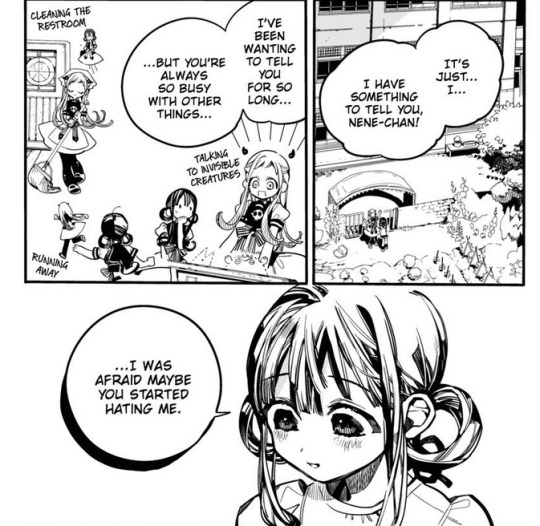
ok, sure, let's make the already most shallow friendship in this manga even more of a yuri bait.
#i am not surprised tho the anime doesn't really care about aoi#did you see how long/full of budget the 'hanako possesses Nene and harras Aoi' scene was? while they refused to add even a quick slide show#to inform the audience that Aoi being popular fucked up her life to the point of being harrased AS A TINY KID?#they already used her for the 'there are hands in these pictures' exposition in season 1 and her feelings has 'no use' for the main trio#so way it goes!#if empty fanservice is the goal of course it is better to leave 'the important thing she have to say!' hidden#and keep anything about 'boys want her' only jokey to make people not think about hanako's actions too hard#it makes so much sense that it makes me depressed.#if we do reach the grim reaper arc in the future i do not have much hope for how they'll treat aoi story#tbhk#toilet bound hanako kun#jshk#jibaku shounen hanako kun
393 notes
·
View notes
Text



Originally I was gonna draw her in my favorite outfits she's worn, but with barely any digging I realized she consistently has the best looks- as well as the most- and it will take way too long to pick through them. So I just drew her.
#fanart#drawing#one piece#cat burglar nami#nami#i've fallen into a trap#where whenever i draw nami#i just draw my first current thought for “cute girl”#is it an issue of having limited variety in my anime drawings?#perhaps#could i stylize her a bit more?#i may#but i fear that Nami has actually become my standard for a cute girl#and has become a fundamental issue#anyway#i really like how salty she is#she hates fucking everything and I feel like nobody talks about that#she just wants everyone she doesn't like to die#and she doesn't like sports#probably#i hope so#i don't like sports either
618 notes
·
View notes
Text
Actual Ultimate Classpecting Guide
For real this time.
Buckle up, this is a really long one. For everything that's posited, I can provide textual evidence; that being said, I'm not going to be including the textual evidence within the essay itself, because it's already long enough as-is. As such, please feel free to ask for clarification or sources on any assertion, and I'll do my best to provide.
Before we begin, there's some things to discuss about how we're going to be approaching classpect in the following essay. In numbered list form for our short attention spans:
1. There is a concept Hussie talks about multiple times in his book commentary, "personality alchemy" - the idea that there are these "platonic ideals" of certain characters, which can be mixed and matched with others, in order to create new characters. The examples he gives are of how Eridan was a proto-Caliborn, how Kanaya has shades of Jade, how Nepeta was a proto-Calliope, and how Sollux and Eridan have shades of Dave in them. Classpecting is fundamentally a form of this personality alchemy:
2. Class describes the character's arc and emotional hurdles, while Aspect describes the character's base personality traits by which this arc is experienced.
3. For example, all three Seers struggle with hubris: Rose's need to be the smartest person in the room led to her being manipulated by Doc Scratch, Terezi's obsession with meting justice led to her engineering a situation where the only option was to kill Vriska, and Kankri's desire to be seen as a spiritual leader amongst his friends led to him furthering their divisions and harming them.
Then, when their pride is shattered, they cope by inflicting willful self-blindness: Rose turns to drinking herself stupid (the opposite of Light's sway over knowledge), Terezi gets down with the clown (the opposite of meting out Mind's justice, as it's a Gamzee W), Kankri goes celibate (Blood L) despite his clear romantic feelings for certain teammates.
4. As for Aspect: note how all three Life players share the personality traits of optimism, stubbornness, and obstinacy. All three Breath players share an immaturity and naïvety, and are quite frankly irresistible to people for some reason. All three Light players share a need for the spotlight and a tendency toward long-windedness and persnicketiness. So on and so forth.
What's interesting is, if you start analyzing characters that share Classes and Aspects, these specific types of similarity crop up over and over - all our Knights struggle with insecurities and facades, both our Bards have a crisis of faith. All three Breath players have an aspect of immaturity and childishness to their characters, and all three Light players are deeply concerned with appearing intelligent and feeling important.
5. As a result, this guide is NOT intended for classpecting real life people, because we are complicated, we contain multitudes, and we don't have arcs. This is primarily an analysis of what Class and Aspect mean in Homestuck based on textual evidence, because I genuinely believe that you can basically figure it out if you read carefully.
6. Duality, and the idea of "equal and opposite," are major themes within Homestuck - Prospit and Derse, Skaia (described as a crucible of birth and creativity) and the Furthest Ring (the literal afterlife). Which classes are involved in an Active/Passive split, and opposing Aspects, are the same way. This is the primary method I used to determine the Active/Passive pairings and opposing Aspects. After all, as Callie describes, both Thieves and Rogues are classes "who steal" - so, too, do I try to unify Classes by a common theme, even if they diverge wildly in how that theme is expressed (as Thieves and Rogues do). In the same way as the opposite of "up" is not "apple," but "down", because "up" and "down" are both fundamentally concerned with relative vertical position, so too can be defined concepts like Breath and Blood, Hope and Rage, Light and Void - as well as the reasoning behind Class pairings like Heir and Page, Maid and Knight, and Seer and Mage.
7. Descriptions for both Class and Aspect are left deliberately vague and up to interpretation within the comic itself, and this is by design: the actual manifestations of an Aspect can vary wildly given the Class, and even individual person, that it's tied to. Calliope even makes note of the fact that, under the right circumstances, someone can manifest effects that appear to be the opposite of their aspect. She's also careful to couch her language in "may" and "can" - because these concepts are intentionally somewhat nebulous and malleable. As such, while this guide certainly lays down what can be gleaned and inferred from the text, do note that Homestuck runs on a soft magic system, and as such, nothing stated is firm, 100%, must-always-be-this-way - just an overview of what we've seen.
8. There is often great overlap between Aspects, Classes, and Classpects - which Calliope herself notes. Heart and Blood are one of the most salient, as they both have a fixation on relationships, and Calliope mentions that under the right circumstances, a Classpect may even be able to manifest what appears to be the opposite of their Aspect. Again, Homestuck operates on a soft magic system, so this is a feature, not a bug.
ASPECT
There's a little less to say about Aspect, not because it's less complicated, but because "base personality traits" are much more nebulous compared to Class's sway over character arc. Still, Aspect represents the fundamental way a character is, and thus, color every interaction that character has. There's a reason Ultimate Selfhood is sought through Aspect, not Class - Aspect is the core of the character's being, what makes that person that person.
That all being said, Class has major sway over how an Aspect manifests, and certain classes can even invert the Aspect and even the character's role in the party. As such, these descriptions must be parsed carefully in relation to Class. Moreover, due to the soft magic system, there is at times overlap between unrelated Aspects, which can also be exacerbated by Class - Heart and Blood being the most obvious in this regard. Still, overall, you'll find the Aspects to be fairly distinct from one another.
Please also note that every Aspect can deal with its literal counterpart by default - Light players can wield lasers, Breath players can wield the breeze, et cetera. Because this kind of goes without saying, and because the non-literal stuff is more interesting to discuss, I'm not really going to go into too much detail about the literal qualities.
Finally, something interesting to note is that nearly every Aspect follows its own Hero's Journey cycle - full actualization for each one usually means reaching around to its opposite Aspect, and taking lessons from them - for example, Breath players need to learn maturity and responsibility, while Blood players need to learn relaxation and whimsy. Thus, an Aspect at its worst manifests in two ways - either a toxic overabundance of the Aspect's worst traits, or such a dearth of the aspect that it begins to resemble its opposite. Only by reaching into the opposite, however, can the player be tempered and reach full maturity - can they become more of who they are.
SPACE / TIME
Space and Time are both concerned with physical reality, goals, and the way one approaches them.
Space is associated with "the big picture" - with recycling, reproduction, and the interconnectivity of all things. The aspect also presides over the enjoyment of the journey over the destination - Space players serve as reminders that the present moment is as important as the end goal. Space is often a more passive Aspect, being the stage upon which the story is set. They're the hosts of the party, and the one who marks the ending.
Its players reflect these tendencies, often being feminine, with penchants for life-giving acts such as gardening. Their personalities tend towards frivolity and silliness, finding it difficult to stay on-topic or bring full gravitas to serious situations. Perhaps a better word would be "distractable;" when the aspect is so concerned with all things in connection with each other, it's easy to lose track of details, and it's easy to enjoy things simply as they come. Space players tend to be kind, patient, and forgiving, which is a strength as much as it is a flaw; it's easy for malicious actors to take advantage of this compassion, or for the Space player to find themselves in a poor situation by being overly permissive. They can easily be painted over by stronger personalities, and tend to struggle with romantic relationships, as they attract many with their kind and giving natures, and few are naturally so considerate of the Space player in turn.
"Passive" is a good word to use; at a toxic overabundance of their Aspect, Space players are trampled underfoot. They become enablers, servants to dark forces, or so lost in their own worlds that they neglect the one they live in. With their Aspect "inverted," a Space player becomes a demon of poor prioritization. Distracting not just themselves from their true purpose, but others, too, the Space player will wreak havoc by overemphasizing unimportant topics and ignoring important tasks. This superficially resembles Time, in that the Space player will become fanatically dedicated to their task, but note that the poor prioritization is still Space-esque at its core.
Still, within this nadir is a valuable lesson: the strength of self-assertion, and the determination to see a goal through. These will allow the Space player to weed their garden, separating good from bad, allowing it to flourish like never before.
Time, in contrast, is associated with "the little things" - with details, minutiae, and processes. Time presides over the struggle toward something greater, the endurance of hardship with an eye on the prize - the destination over the journey. Time players are the ones keeping track of the tasklist, marking off each item as it reaches completion; they are the tireless workers keeping the whole engine running.
Time players, thus, are ones whose lives are marked by struggle. They are highly goal-oriented; in contrast to how Space players can easily move from goal to goal, task to task, Time players feel bound to see things through to the end, finding satisfaction only when they've achieved their desired result - and only until they come across the next goal in their journey. A Time player isn't happy without a goal to work towards, a craft to polish, a prize to win - but this driven nature can easily be its own downfall, as it leaves little room for the player to admit to their own shortcomings, or ask for help from others. Moreover, their focus on minutiae can leave them blinded to the bigger picture, and it's easy for a time player to fall to despair, able to do nothing more but spin their wheels. They're prone to directionless anguish, frustration, and resentment towards the seeming futility of their actions, becoming destructive and defiant even when it doesn't serve them to do so.
At a toxic overabundance of their Aspect, Time players become explosively destructive. The ultimate "goal" of all things is death, with which Time is associated, and accordingly, Time players have a penchant for aligning themselves with futility and entropy, struggling so hard that their thrashing leaves a trail of annihilation in their wake. With their Aspect "inverted," Time players detach entirely - they can become so fed up with struggle that they simply opt to lay their weapons down and let the end take them. It's very easy for them to come to the conclusions that either everything matters, or nothing matters. This superficially resembles Space and its big picture thinking, but note that its framework of struggle, and whether or not a goal needs to be pursued, makes it a Time concern.
But the inherent meaninglessness of existence is, in itself, an important realization to make - that whether or not anything "matters" in the grand scheme, things can still be worth doing, worth caring about, and worth investing in. This realization allows the Time player to attack their goals with renewed vigor and greater clarity, which in turn means that the party becomes an efficient, well-oiled machine.
BREATH / BLOOD
Breath and Blood are both concerned with directionality, interpersonal relationships, and autonomy.
Breath is the Aspect governing freedom, liberty, and independence; it is a force that breaks shackles, clears out social norms, and refutes "the rules," whatever those rules may be. Breath players can't be tied down, whether by physical bonds, societal rules, or even the ineffable forces of the narrative itself. They are leaders of example, pioneers, and trailblazers, opening new paths for their teammates to follow.
Breath players are goofy and gullible, often with hearts full of childlike whimsy, naivety, and even immaturity. They are friendly and well-meaning, fond of simpler things, and easily swayed by others. They approach the world with a sincere and innocent good-naturedness, like a baby animal before it learns to be fearful of danger. Something about this sincerity seems to make Breath players irresistible to others, and they often find themselves the subject of romantic attraction. However, in this childishness is also the great pitfall of many Breath players - their natures are naturally conflict-averse, and egotistical the way a child can be, failing to see beyond themselves. They can be incredibly callous when not considering the consequences of their actions, or the viewpoints of others.
At their worst, Breath players are irresponsible and callous. They'll shirk the consequences of their actions, blaming anybody but themselves, or simply choose not to care who they hurt in order to get what they want. They may even choose to stop making choices for themselves, leading to the "inversion" of their Aspect - a voluntary loss of freedom and independence, derived from an Breath-like aversion to responsibility, which superficially resembles the bondage of Blood.
But if they are able to overcome these tendencies, a Breath player will learn what true responsibility looks like - responsibility for themselves, their choices, and the effect they have on others. Armed with this, a Breath player's ability to break bonds can be focused into a clear force for good, clearing away all obstacles and harmful societal standards, leading the charge into something new and beautiful.
Blood, in sharp contrast, is the aspect that governs bondage, contracts, and interdependence. It is a force that binds. Under Blood's sway are not only romantic entanglements, but familial, friendly, and societal ones as well. This aspect sees overlap with Heart, but the division is this: Heart concerns itself with feelings, and Blood concerns itself with compatibility. Blood players are diplomats, forces that remind us all that we are more similar than we are different, and that that similarity should bring us together when we are on the verge of pulling apart.
Blood players, reflective of their Aspect's association with bonds, tend to be neurotic and obsessive. They have a tendency to over-examine and overthink, constantly fretting over the infinite and infinitesimal variables that influence the shape of society and interpersonal relationships. However, this judgmental nature stems from a deep well of idealism and empathy; Blood players can't help but care about others and wish for the best for them. In a way, this makes them one of the most mature members of the team, being concerned with its overall well-being. Unfortunately, their prowess does not extend inwards, and their assessment of themselves is usually direly incorrect - all the worse because Blood players always feel responsible for those around them. Blood, being the Aspect concerned with interdependence, is the weakest one when all alone.
Thus, it's easy for the Blood player to wind up controlling - desperate to make sure everyone is moving according to their vision, they'll become iron-fisted dictators, with a "my way or the highway" approach to social interactions. It's easy for them to wind up pariahs of their own making, becoming so critical of others, or so adamant about enforcing their own will, that they inadvertantly sever their ties - something that superficially resembles Breath's independence, but is truly a result of Blood's neuroticism.
But with that space and separation can come great clarity. Blood players must learn to relax their grip, and allow people room to breathe - including themselves. Once able to grasp that sometimes bonds must be forged with a soft touch, Blood players' natural empathy shines through, allowing them to build something so much kinder and greater than the sum of its parts.
LIGHT / VOID
Light and Void are both concerned with knowledge, ontology, and "narrative relevance".
Light (as well as its counterpart) are perhaps best understood through the lens of "narrative" - this idea that, of all things that do and don't exist, and all events that do and don't happen, only the ones put to page are "relevant". Thus, Light is associated with knowledge and luck - that is to say, it's associated with the knowable, the objective, and the concrete, and the ability to determine "important" events. Light players have read the book they're participating in, and able to serve as luminary guides from one plot point to another, lighting the lampposts for others to follow.
Light players, naturally, are erudite and educated, possessing keen intellects and cunning minds. They are fond of knowledge itself, of markers of status and prestige - whether that's wealth, the adulation of the masses, or a massive library. They harbor a desire to be important, to be seen, to be acknowledged, and are happiest when they are looked up to. Conversely, they deal poorly with being looked down upon. Their confidence transmutes easily into hubris, and they struggle with having that pride challenged. As such, they tend to be volatile and unpredictable, quick to retaliate against those who threaten their egos, or obsequious to those whose acknowledgement they desire.
Their desire for the limelight can quickly spell disaster - they can become incredibly cruel, harsh, and egotistical in their pursuit of narrative significance. They forget, in their obsession, that they, too, are fallible and flawed, and the inevitable reminder can come very harshly. Light players struggle with moderation, and as such, when they feel shame, they'll often take drastic measures to cope with it - deliberately darkening their own influence or intellects, removing themselves from the "story" entirely - something which superficially resembles Void's penchant for the background, but which is firmly rooted in Light's obsessive need for drama.
But in experimenting with narrative insignificance, Light players can reach an epiphany - in their absence, others may shine, and that can be a wonderful thing. Light players, then, can learn to shine not just for their own sakes, but for the sake of others, allowing them to weave a story even more brilliant than any that can be weaved alone.
Void, in contrast, is the blank spaces between the words. That which is secret, subjective, unknowable - these are Void's domain. It's associated with taboos and hidden things, sexuality and pleasure. It's also associated with the empty canvas - the blank space before creation, and the oblivion to which creation is eventually destined for. Thus, it stands for infinite possibility, though the collapse of those possibilities into a reality removes that reality from Void's domain.
Thus are Void players ever cosigned to the background, though this generally suits them fine. Void players are very self-possessed. Where Light players tend to exaggerate and complicate, Void players are honest and simple, preferring straightforward solutions. They don't tend to think very hard, instead letting intuition and emotion guide them to where they want to be - which makes them one of the more stable personalities on a team. However, this simplistic, feelings-driven approach often leads to pleasure-seeking behavior, poor impulse control, and overindulgence in vice, and from there, to irrelevance, with which Void is so closely interlinked.
Void players are especially prone to vice, and at their worst, will become so drunk on pleasurable activities that they pursue them to the active detriment of the party's goals or the Void player's self-improvement - making them the ultimate irrelevant character. They can also very easily drag others into their mélange, with a forcefulness that resembles Light's illuminating guidance, but which is ultimately rooted in Void's pursuit of personal pleasure.
But there's a lesson to be learned in Light's domain: how to bring themselves into relevance and greatness. A Void player, once they learn to pursue not just personal pleasure, but a greater satisfaction for the collective whole, can drag the Void behind them, kicking and screaming, to where it'll be of use.
MIND / HEART
Mind and Heart are concerned with what it means to be a sentient being, with identity, and with why we do what we do.
Mind is the Aspect associated with logic, rationality, karma, ethics, and justice. To a Mind player, they "are" because they "think". They are keenly aware of the consequences of every action, and well-versed in cognition and behavior, such to the point of manipulating others with ease. Deeply concerned with the "effect" of cause-and-effect, Mind players are always cognizant of debts and credits, where justice is owed and where it has been over-meted, and their subtle machinations culminate, like well-placed dominoes, in grand and explosive finales.
Mind players are schemers - it's in their nature. They have a tendency to view the world as a puzzle or game, with themselves and the people around them as pieces on a board, and set as their standard rules the laws of ethics and karma - owed debts and overhanging credit - guilty and innocent. Mind players are wickedly cunning, and have an high success rate with every scheme they commit themselves to, but the grand downfall of all these tendencies is that they tend to lack in a sense of identity, and have a poor grasp on their own emotions or desires. While they may know how to provoke a desired reaction, they don't know how to change someone's mind. They often find themselves grappling very painfully with their own selfhood, with feelings of emptiness, inadequacy, or uncertainty.
Thus, a Mind player at the worst zenith of their Aspect is heartless and cruel. Leaving no space for empathy or even personal feelings in their plans, the Mind player will plot for an ending as heartless as they are. But a Mind player is never truly without emotion, and ignoring their own feelings causes them to manifest in terrible ways - Mind players have a tendency to seek toxic, codependent relationships, hoping to find external validation, subjecting themselves to the wishes of others, which can appear like Heart's fixation on feelings and desire.
But in recognizing their own need for emotional validation, and the importance of their own feelings, a Mind player can realize that there's an entire dimension to the game they've been playing that they've been ignorant of. When a Mind player learns to temper their schemes with empathy, compassion, and kindness, how much more success they'll see - and how much happier that grand finale will be!
Heart, then, is associated with feelings, motivations, intuition, the soul, and the self. To a Heart player, they "are" because they "feel" like they are - and they're keenly aware of the multitudes that are contained within themselves. Deeply concerned with the "cause" of cause-and-effect, they're drawn to desires, those of themselves and of others, especially where strong feelings are concerned. Heart players are gifted with an intuitive understanding of those around them, both their good and bad qualities, and are tasked with the grand task of bringing out the best.
It stands to reason, then, that Heart players have a firm grasp on who they are and what they want. For the same reasons, it's difficult for a Heart player to truly hate or condemn another person, because they are so adept at understanding them. However, this understanding comes with a price - because the Heart player is so aware of themselves, they can't escape their own worst traits - nobody self-loathes as accurately as a Heart player can. Nor can they ever truly be untruthful with another, making them poor manipulators. Capable of presenting a different facet of themselves as the situation calls for it, certainly, but just as it's impossible to lie to a Heart player, who always knows how someone really feels, it's impossible for a Heart player to lie to themselves.
With this sincerity comes vulnerability. Heart players wear theirs on their sleeves, and at their worst, this can make them demanding, needy, and sensitive - so eager to connect with others emotionally that they'll cramp themselves to fit others' desires. But they can't ever keep this up for long; Heart players have a tendency to withdraw from others after being hurt too often, finding it easier to be alone and silent about their feelings than to deal with the pain of rejection. They may even work to manipulate others, preying on their emotions and desires to force them to act in their worst interests. This superficially resembles Mind's cold logic, but unlike Mind's cool rationality, Heart's aloofness is a mask, an attempt to avoid pain by pulling away.
But this isn't purely a negative, because a Heart player can learn a healthier form of detachment, and separate out healthy and helpful desires from harmful and detrimental ones. Given this clarity, the Heart player becomes the team's emotional core, able to raise up each teammate's best qualities, while helping them deal with their worst, enabling everyone to be the best possible version of themselves - which the Heart player knew them to be all along.
LIFE / DOOM
Life and Doom are concerned with outlook, with journeys, and with trials and tribulations.
Life is an aspect concerned with healing, growing, and improving. It is associated with beginnings, optimism, and positive emotions. The very essence of Life lies in its healing abilities, in this idea of overcoming the odds and triumphing over hardship and difficulty. Life is action, movement, and motion, and its players can scarcely hold still. Life will find a way - and Life players harbor the same immutable belief; they are the most stubborn weeds in the garden, the cockroach that survives the apocalypse, and the beating heart that refuses to stop.
Life players tend to be optimistic and confident. They are self-assured individuals, with a stubborn belief that good things are on their way, and any hardship they face is not only temporary, but something that can be overcome. They can find the silver lining in any cloud, and enjoy themselves under any circumstance. They love to nurture, to care for others, though this love has a tendency to be one-sided. Indeed, Life's stubborn nature is its players' greatest pitfall; their persistence easily becomes obstinacy, and their confidence can become condescension. Their self-assured nature easily becomes egotism, and they can have great difficulty grappling with those who don't share their views - even coming to oppose those who bring emotional pain and suffering that can't be easily fixed.
It's very easy for a Life player to decide another person isn't worth their attention, and opt to leave them behind - after all, Life has to move forward, no matter what it tramples in the process. At their worst, they're stubborn to the point of not listening to anyone but themselves, confidence becoming blockheadedness. This focus on forward progress without looking back can even cause Life players to become harmful to others, so focused they are on their own growth that they don't notice that they're choking everyone else out. This may resemble Doom's death in its worst case - arresting everything else, eventually blocking even their own path with unruly, out-of-control fecundity.
Thus, a Life player needs to learn to more gracefully accept Doom's influence - to pause, slow down, and consider viewpoints that are negative, unpleasant, or difficult. A Life player, endowed with moderation, will be able to cultivate a bountiful garden, rather than an unruly jungle - a place for all to flourish and live in plenty, never wanting for anything.
Doom, then, is the aspect concerned with death, with rest, and with endings. Doom is associated with suffering and with negative emotions, with peace, with sleep, and with dreams. Doom players have a natural penchant for prophecy, and are often dual dreamers, able to take advantage of both Skaia's oracular clouds and the Horrorterrors' voices over Derse. All things must eventually come to an end, and not all times will be good; in these troubling times, Doom players shine, as they are the guides who call the murk home, and know best how to navigate rough waters, course-correcting until the storm passes.
Doom players tend to be deeply pessimistic. They experience, to a much more magnified degree than others, negative feelings and impulses, and it's difficult for them to see the world without seeing its flaws, first and foremost. They are not healers, but commiserators, those who understand greatest that sometimes there's no way to deal with tragedy but to simply sit with it and wait for it to pass. The counterpoint to Life's insistence on breathless positivity, Doom is a reminder that pain, grief, sadness, shame, and guilt are not unnecessary things - in fact, excising them can lead to terrible consequences. Doom players are the universe's martyrs, often taking it upon themselves to course-correct, to sacrifice themselves in order to give others a chance to continue on, to avert a terrible fate.
Unfortunately, this tendency also brings with it a tendency for Doom players to wallow in misfortune, or worse, to take themselves out of the picture, giving up entirely on seeing a better ending. As if energized by their own sense of futility, a Doom player at the "inverse" of their aspect may seem to echo a Life player's focus on forward progress and motion, actively spurring their team on towards an untimely demise.
A Doom player must learn to harness this sense of progress for good, rather than harm. A Doom player, once able to grasp the joy of life even in the greatest depths of despair, will be able to fill even the darkest hours with peace, meaning, and hope.
HOPE / RAGE
Hope and Rage are concerned with permission, and are the lens by which we define reality.
Hope is described by Hussie in the book commentary as being "framed as the most powerful aspect" because it is, literally, an aspect that defines reality. Its specific ability is lies in reducing the "fakeness attribute" of something, thus making it "real". Hope is associated with convictions, with idealism, with faith, order, holiness, and, of course, with magic - which Hope turns real. Hope is permission itself - a reality-breaking ability to look at the world and decree that it must be another way, a way in which the Hope player believes it ought to be.
Thus, Hope players tend to be hard-headed zealots, with no self-awareness whatsoever. Their inclination towards powerful beliefs makes them very difficult to dissuade from a path they've set their minds to, and their specific suite of abilities makes them terrifyingly likely to make their vision come true. Hope players are usually not particularly cunning, nor particularly intelligent, nor even particularly empathetic. Given the Aspect's focus on conviction and faith, it's usually very difficult for Hope players to notice anything occurring beyond their own minds and feelings. Thus are Hope players hopeless optimists, hopeless romantics, and hopeless in general - often great sources of embarrassment to their teams, as their naked sincerity is painful to witness. However, their ability to define reality does not leave them when their beliefs are faulty (which they often are, given Hope players are not particularly introspective, either), which is what makes a Hope player so dangerous.
A Hope player can easily be set on the wrong path - as convicted as they are, and as difficult to shake from that conviction as they can be, Hope players can easily march down a path of destruction, if not persuaded with a deft touch and gentle guidance. In the event that their faith is broken, Hope players easily become despondent and lost, floundering and wishy-washy, which superficially resembles Rage's self-consciousness, but is truly just a lack of direction.
But Rage has a powerful lesson to teach Hope players - that of questioning themselves, interrogating their own beliefs. Once their convictions have gone through rigorous scrutiny, revised into the best, brightest versions of themselves they can be, a Hope player is a worker of miracles - speaking into existence a beautiful future on faith alone, proclaiming that how they see the world is how the world shall be.
Rage, then, is the power of denial. If Hope reduces the "fakness" of a thing, then Rage reduces its "realness". Rage, too, is a means of defining reality, in this case taking a torch to the aspects of reality that it rejects. In more passive Classes, this works in subtler ways, stoking others towards destructive fury. Rage is associated with anarchy, chaos, revolution, destruction, anger, and nihilism. A Rage player will not suffer a world that does not satisfy them, breaking it to pieces, such that something new can take its place.
Therefore, Rage players are prone to harboring anger and resentment, discontentment with the status quo, and faith only in that what currently exists must somehow be dismantled. However, unlike Hope players, who can't help but be pathetically sincere, Rage players are incredibly self-conscious, and often try to mask and hide their embitterment and anger. This, ironically, leads to further ostracization, as others can tell they're being inauthentic. This only further compounds their sense of alienation, and drives them further into smoldering resentment. This makes Rage players sound volatile and dangerous, and they are - but the same fury that moves them is the fury that ignites revolts and tears down oppressive regimes, a necessary and vital well of energy and momentum. It takes careful handling to ensure that the team's Rage player can channel this energy towards righteous causes, rather than marking all as a target for their destructive ire.
In the worst-case scenario, the Rage player turns that rage out indiscriminately, deciding that there is nothing worth fighting for - only unpleasant things to be brought to ruin. This is Rage at its toxic overabundance. Conversely, a Rage player can retreat so harshly into their mask that they allow others to dictate their beliefs, taking them to heart - an action motivated by Rage's destruction (this time, turned inwards) that superficially resembles Hope's convictions and faith.
The true path for a Rage player is a healthy balance - to allow themselves some of Hope's sincerity, and by doing so, to become more sincere and true. This will let them release the pressure of their mounting ire, such that it can be converted into productive, rather than destructive, energy - the heralds of a revolution, razing away the faulty, corrupt old systems such that something better and new can take their place.
CLASS
As previously stated, Class governs a character's character arc - the character's starting circumstances, whether their conflict is primarily internal or external, and what major aspect of their Aspect becomes a hurdle for them to overcome.
In the same way an Aspect's sways tie into the character's base personality, the character's Class abilities tie into the kinds of struggles they face, and have great influence on how their Aspects manifest.
That being said, a character - and their Class - are always subject to their Aspect, as their Aspect is tied fundamentally into who they are. Thus, it can be said that a Light player will always have an affinity for knowledge and provide Seer-esque guidance even when not in a Seer role, a Doom player will always have prophetic abilities even with a non-prophetic class (note that Mituna, an Heir, still had prophetic visions, despite those generally being the realm of Mages and Seers), and a Life player will always have a penchant for healing, even paired with a destructive Class like Prince or Thief (the Condesce, after all, could still extend life; a Prince of Life would likely manifest not as one who causes plants to wither and die (this would actually suit a Prince of Doom), but one who destroys in the way of nature overtaking an abandoned shack, or a forest breaking down a body).
This means that when a character's Classpect inverts their Aspect, it doesn't mean that they suddenly become a hero of the opposing Aspect - rather, it means that, at their very worst - at the nadirs of their character arcs - they will lean so much into their Aspect's worst traits that it will superficially appear as the opposite, when all it really is is an absence of themselves. Dave, a Time player, usually so attentive to detail (despite his disaffected facade, he's always paying rapt attention to Karkat's rants, and noticing all the clues pointing to his destiny of defeating LE), at his lowest emotional point (arguing with Grimbark Jade after sobbing about his lost childhood whimsy), states that he doesn't think Lord English is that big a deal, and never even did anything directly bad to him or his friends - when he was literally directly haunted by LE via Cal his entire childhood. Similarly, Rose drinks herself stupid in order to cope with her mother's death.
Note how, superficially, this almost appears to be an invocation of Space's "big picture thinking," its passivity and permissibility, or how Rose's case appears to be Void's tendency to indulge in vices and pleasure - but they're not. Time's worst traits superficially resemble Space, Light's resemble Void, and vice versa - Grimbark Jade is the Condesce's taskmaster, and Porrim at her worst was as much of a nag as Kankri, trying to do a Time player's managerial job. Horuss and Equius at their worst won't shut up and won't stop talking over their partners. So on and so forth.
Finally, Calliope tells us a couple things about Active/Passive pairings. The first is that Calliope introduces the idea of paired classes with the idea that both Rogues and Thieves "steal" (and later, that both Princes and Bards "destroy"). This presents the idea that both classes can be roughly summed up with the idea that every pairing can be summed up with a common theme.
The second is her description of what makes a Class Active versus Passive - that Active Classes move their Aspect to benefit themselves, whereas Passive Classes allow their Aspect to be moved in order for others to benefit. In a way, they're like active and passive voice in grammar (to tie in with the way Classes and Aspects are so tied to ideas of narrative and character arc) - an Active Class performs their Aspect, and a Passive Class allows the Aspect to be performed "by others" (the famous piece of advice regarding telling the two apart being that a sentence written in passive voice can have "by zombies" tacked to the end of it - eg, John is attacked "by zombies", as compared to active voice - John attacks).
Thus, the Class pairings, along with their basic themes, are as follows:
KNIGHT - / MAID +
"One who controls."
Knights and Maids are paired together through two key factors: the first is that they both hold leadership or managerial roles; the second is that both classes carry the connotation of serving a Lord. Fittingly, they are both struggle with the control of malicious forces - Knights with prophecies indicating their role as heroes, Maids with direct usurpation by malicious forces.
PAGE - / HEIR +
"One who inherits."
Pages and Heirs are paired together because they both fundamentally deal with the great inheritances placed before them. Pages can come into incredible, limitless power - but they must struggle and work hard for it; Heirs begin the game in societal comfort and wealth, and must learn to defect from their decadence.
THIEF - / ROGUE +
"One who steals."
Thieves and Rogues are highly adaptable, as Thieves are capable of fantastic on-the-fly adaptation, whereas Rogues have an infinite toolbox at their disposal. They are both provocateurs, shakers of the status quo, though the Thief does so for personal gain, while the Rogue does so to right injustice.
MAGE - / SEER +
"One who guides."
Mages and Seers are tied together by the gift of prophecy and future sight. Seers are privy to the endless branching paths that the future may take, while Mages are gifted with the ability to outright determine a future that will certainly happen, appearing to be prophecy.
WITCH - / SYLPH +
"One who changes."
Witches and Sylphs are individuals blessed with great magic, but poor judgement. Sylphs heal and nurture, but are drawn to those with strong desires, and enable them to cause great harm; Witches, meanwhile, possess strong emotions, which they often use as moral guidance, for better or worse.
PRINCE - / BARD +
"One who destroys."
Princes and Bards are representatives of society - the one who determines its course, and the one who recounts its passing. Princes suffer from a toxic overabundance of Aspect, and are prone to spectacular meltdowns, whereas Bards are always poised for a crisis of faith. Both are responsible for catastrophic failures - but also breathless victories.
INDIVIDUAL CLASSES
KNIGHT
"One who controls [Aspect] or controls using [Aspect]."
Knights are frontline warriors, rallying points behind which the party falls into line. Although they are often leaders, just as often, they are logistical planners, strategists, or simply the team's beating heart. They are almost always thrust into positions of narrative significance, often carrying grand destinies or even outright heroic prophecies on their shoulders. The are the party's rallying force, its center, and a guiding light - the one to lead the charge, behind which the party will follow.
The primary character struggle a Knight will have is with crippling insecurity. Knights are prone to self-loathing and imposter syndrome, and will often adopt a façade in direct opposition to their aspect (ie, their fundamental personality) in order to cope with their feelings of inadequacy. Thus, their relationship with their aspect becomes love/hate - though they're naturally drawn to their aspect, and even naturally skilled at utilizing it, they have a tendency to become their own worst enemy, as their insecurities make them push their façades, and their façades distance them from their aspect.
"Controlling their Aspect" means that the Knight has easy access to their Aspect, wielding it like a tool or weapon - for good or for ill; "controlling using their Aspect" is what grants Knights their leadership abilities, able to dictate how others ought to act in accordance with the Knight's Aspect - whether their understanding of their Aspect is high or low, whether their advice is good or bad.
Therefore, at their worst, a Knight will fall prey to their insecurities, retreating into their facades, rejecting their Aspect, which will allow disharmony or misuse of it to proliferate throughout the team. They may even wind up deliberately twisting their Aspect's presence within the team so that they never have to be confronted by it; these distortions ripple outwards and eventually culminate in major catastrophes, all on account of the Knight's negligence.
But at their best, a Knight is a shining beacon and guiding light; when they come to terms with themselves, and allow themselves to be comfortable in their own skin - when they no longer allow themselves to be ruled by their insecurities and anxieties - they ensure that their aspect is harmonious wherever it appears throughout their party, and can wield it expertly as a weapon, as if it were their own flesh and blood.
MAID
"One who allows control through [Aspect] or allows [Aspect] to be controlled."
Unlike Knights, which take positions of frontline prominence, a Maid is a managerial presence in the backlines, though no less crucial for the smooth functioning of a party. Just as the invisible hands of the hired help keep a household running, the Maid will be called upon to provide vital services to keep the game stable, even if those services are more noticeable by their absence than their presence. Maids are often the party's unsung heroes or even shadow leaders, tugging at invisible strings, fingers on the pulse.
A Maid's primary character struggle will be that of escaping oppression. Maids tend to start the game in positions of subjugation or subservience, especially to malicious forces, and their abilities often end up being exploited to serve their masters' ends. Therefore, one may even have the impression that a Maid is ruled by their aspect, held prisoner and slave - at least until they're able turn the tables.
"Allowing their Aspect to be controlled" means that Maids are capable of directly dispensing their aspect unto others - a Maid of Time can dispense time unto foes, pausing them in their tracks; a Maid of Life can grant so much life that they can revive the dead. Their boons are great and direct, straightforward in a similar manner to Knights. "Allowing control through their Aspect" grants them their uncanny managerial abilities, as their aspect dictates the realm in which nothing occurs without the Maid's knowledge or permission, a realm made available to whomever the Maid's allegiance lies with.
Thus, at their worst, the Maid becomes a saboteur. Exploited by malign forces, their abilities to allow control over others through their aspect, or control of their aspect, makes them perfect vehicles by which their aspect can be hijacked or usurped, and made to turn against the party, and they often find themselves placed into these positions through no fault of their own. It takes the party banding together to shake off the forces that would keep a Maid in bondage.
However, at their best, Maids ensure that the party can never go too far off the rails. There is a place for everything, and everything will be in its place; a Maid is a supply line, a safe haven, and a promise that everything will be neat and tidy when the party returns from war. When the Maid belongs to themselves, their homestead becomes a fortress, and nothing occurs under the Maid's watchful eye without their express permission.
PAGE
"One who works to inherit [Aspect] or inherits [Aspect] for themselves."
Pages are a class defined by promise. As the name suggests, a Page begins weak, but has the great potential to develop into one of the most powerful players in the game. The exact nature of a Page's powers are vague, not because they are insignificant, but because they are so great that it's difficult to encompass them all. At the apex of their arcs, Pages are capable of miraculous feats, overpowering even Lords and Muses - if only they could reach that point and stay there.
A Page begins the game weakest of all, reflective of their long journey of growth. Where most classes only fall into deficit of their Aspect at their lowest emotional points, Pages begin their arcs in deficit - exhibiting character traits opposite to those their Aspect normally encompasses. Moreso than any other class, a Page must learn to grow into their Aspect. Weak-willed, naive, and easily hurt, Pages require careful nurturing if they're to come into their own.
"Working to inherit their Aspect" describes the endless journey of growth the Page must undertake - one with many missteps, backslides, and setbacks along the way. Still, they "inherit their aspect," meaning that their full potential, when realized, is overwhelmingly great - practically becoming their Aspect in humanoid form, capable of utilizing it to its glorious full potential.
However, their nature defeats them, and even if they can attain this state, the Page usually can't stay there for long. At their very worst, the Page's deficit of their Aspect's better qualities can turn the Page into a gravitic well of misfortune - an albatross about the party's neck, the centerpoint, if not inciting incident, of a massive disaster, as their team is sucked in by the Page's natural weakness.
But this is only true as it contrasts to a Page at their best - having grappled and won with the greatest of all weakness, a Page is poised to come into the greatest of all strength. Shown kindness, compassion, and support, a Page at full power reflects a party at their best. A Page at full strength is breathtaking to behold, an unstoppable force of nature, their Aspect made manifest.
HEIR
"One whom [Aspect] grants inheritance or inherits [Aspect] for others."
Heirs, in contrast to Pages, start the game strong. They usually belong to the upper echelons of their respective societies, a position of great wealth, leisure, and comfort, and are set to be inheritors of even greater wealth. Similarly, their Aspect comes to them as if of its own will - it is powerful, but difficult for the Heir to control, reflecting the wealth and status they've enjoyed as birthright.
An Heir's main challenge is that of examining their privilege, and learning where they wish to spread the gift they've been given. Because of their positions of sheltered comfort, Heirs are not particularly world-wise, and often harbor massive blind spots to the suffering of others and the ills of society. As such, they tend to be fairly aimless, given great power but no strong motivations, and have a tendency to simply indulge in their Aspect without contributing great help or hindrance to their team at all.
The Heir's Aspect is practically an independent entity. Being one whom "their Aspect grants them inheritance" refers to how the Heir starts powerful, able to summon their Aspect to perform great, miraculous acts. However, it is highly intuitive and difficult to control. The Heir's challenge lies not in attaining great power, but in attaining control over, and the ability to direct, their existing abilities. Once they do, they can "inherit their Aspect for others" - Heirs become a conduit through which their party can experience their Aspect, making it a usable pool of wealth for them all to draw from. However, because of their comfortable positions, many Heirs end up dallying, finding no pressing need to do so.
But this dallying hides a ticking clock. An Heir's inheritance will come to them, one way or another, and if they aren't ready to receive the great responsibilities that come with such great power, then the power will eventually consume them. An Heir with no clear direction will eventually become lost to their Aspect, entirely removing both from play. Like how wealthy inheritors simply become part of the status quo, so, too, does an Heir disappear into their Aspect, fixing it in place.
Thus, Heirs must learn where they have been blind, where they have been foolish, and what it means to be underprivileged. Then, once they turn their energies towards addressing those injustices - to taking responsibility for building a better future - when their wealth comes to them, they'll be able to distribute it where it's needed most. An Heir, fully-realized, brings their Aspect to heel, and makes it a resource available to their entire team, as if welcoming them all into the family.
THIEF
"One who steals [Aspect] or steals using [Aspect]."
Thieves are, as the name suggests, greedy - much of their arc revolves around a desire to amass wealth, though what's considered "wealth" varies based on the Thief and especially their Aspect. They tend to be callous people by nature, capable of ignoring or trampling over the feelings of others in order to take what they want, in the hopes of filling an emotional void the Thief may not even be fully aware of.
The Thief's playstyle is one of careful resource management. Reflecting a natural tendency to take "wealth" from others, Thieves are unable to use their Aspect without first "stealing" it - a subtractive act which leaves the victim bereft of the Aspect, weakening them in the process. Because of the finicky nature of these abilities, it takes great cunning to be a Thief, and the Class both demands and requires the player to be adaptable, flexible, and quick on their feet, able to effect complicated schemes and engineer the perfect situations for their powers to have the greatest effect. Thieves aren't necessarily strong, but they have a very high victory ratio, because they're experts at turning a situation to their own advantage.
"Stealing their Aspect" refers to the fundamental way in which the Thief class is played, this resource management game; "stealing using their Aspect" reflects how the Thief often becomes a malignant force within the party, viewing their own teammates as caches of wealth to plunder. Thieves are naturally prone to hurting others for their own purposes, craving drama and attention, and being of such callous dispositions that they're able to perform extreme acts of cruelty given the right motivations.
Thieves often become a target of ire within the party, disruptive forces whose quest for personal wealth and fulfillment comes at the cost of those around them. At their worst, they can bring so much heat down upon their own shoulders that the party feels the need to treat them like an enemy, which is disastrous for party harmony. Moreover, it's disastrous for the Thieves themselves, as Thieves seek wealth to compensate for some emotional emptiness, and making enemies of their friends only serves to deepen their ennui.
Thus, a Thief must be taught that true happiness and fulfillment doesn't come from the struggle for wealth, but from the building of something better with those they care about. A Thief, thus turned to heroic purposes, becomes the party's pinch hitter - an adaptable spy, an unpredictable maverick, an element of surprise - and above all, a reliable ally, capable of turning any tide in the party's favor.
ROGUE
"One who steals from [Aspect] or steals [Aspect] for others."
Rogues, on the other hand, call to mind such figures as Robin Hood, stealing from the rich to distribute to the poor. Rogues are at their best when they're agents of a well-planned heist, as they possess an unlimited toolbox - their own Aspect - to play with. Their Aspect is a treasure trove, just waiting for the Rogue to plunder it and share its riches - if only the Rogue can figure out how.
Rogues are forces of revolution. They naturally carry a rebellious spirit, one which bristles at injustice, takes a stand against authority, and questions the status quo. Their ideas are unfocused, however; they know they must rebel, but usually don't start with a clear idea of against who or what. They know that their society is injust, but they don't know how to address that injustice. They know there are villains, and may even know these villains' identity, but they don't know how best to defy them. In a similar way, they're often lost as to how to utilize their Aspect beyond its most basic applications, and usually require external assistance in order to bring out its full potential.
Rogues' true potential lies in "stealing from their Aspect" - an additive act, rather than a subtractive one, as a Thief's stealing is. Rogues are capable of removing their own Aspect's sway over another entity, allowing it to exhibit the characteristics of the opposite Aspect; a Rogue of Void can create things out of nothing, a Rogue of Heart can tease out behaviors and actions. They can also "steal their Aspect for others," allowing them access to their own Aspect's suite of abilities as well. This allows the Rogue incomparable flexibility, their abilities - like their dispositions - rebellious and subversive.
But their rebellious spirit, coupled with their lack of understanding as to who their real enemies are, is dangerous when left unchecked. Rogues often suffer from a failure to start, giving up on trying to understand the deeper implications of their abilities, and of the society they can't seem to find contentment in - but they can also suffer from a worse fate: rebellion without a cause. Rogues' free spirits can lead to them bucking the status quo in ways that actively harm others, performing acts of taboo or poor taste just because that rebellious energy needs to be put to use somewhere. These can have disastrous knock-on consequences, as some things are taboo for good reason.
Thus, Rogues need to be guided - to make connections with others, and come to a greater understanding of the world at large. Once they know their target, and what needs to be done, the Rogue makes sure there are no obstacles along the way - no safe is uncrackable, no prison inescapable, and no problem unsolvable, so long as the Rogue is there to work their magic.
MAGE
"One who guides [Aspect] or guides [Aspect] for themselves."
Mages are prophets, of the "always correct" variety - or so it seems. In actuality, Mages don't "predict" the future, they "choose" it - in a setting where the future is mutable, the Mage's ability is to speak into existence a future they desire, to tip the scales of causality and collapse possibilities into a single definite course. Their Aspect is the lens through which their "prophecy" occurs, a realm in which they command the fabric of reality itself.
As if to karmically balance this incredible power, Mages are afflicted by deep and terrible sadness. They start the game miserable, having been subjected to the greatest injustices their Aspect can offer, tormented by guilt, shame, and self-loathing. Their worldview has been shadowed with a lens of suffering and anguish, and so, too, is their view of the future. Mages usually begin the game having already set several prophecies into motion, and these early prophecies are usually obstacles that the party must overcome.
Mages "guide their Aspect" - this refers to the way their prophecies, that is, their chosen futures, always come true. Their visions may be limited to the sway of their Aspect, but it remains a powerful ability nonetheless. "Guiding their Aspect for themselves," then, outlines the Class's Active nature - the futures the Mage picks must be ones the Mage believes will come to pass.
Unfortunately, Mages have a tendency to pick ugly futures. This isn't out of malice or anger; this is because Mages start the game sad, and without intervention, grow sadder. They're prone to spirals of negativity, self-loathing, and depression, and as their outlook dims, so, too, do their forecasts. Mages suffer, but even suffering can grow familiar - can even appear comfortable or desirable, if the Mage suffers long enough. It's easy for them to grow so accustomed to misery that misery is the only outcome they can see - spelling doom for the rest of the party, one prediction at a time.
But a Mage whose party shows them kindness and forgiveness, compassion and empathy, can pull them out of their misery. How beautiful, then, the future appears! A Mage who believes in a brighter future is a force to be reckoned with. When a Mage can bring themselves to say, "and everyone lived happily ever after," you had better believe they did.
SEER
"One who who is guided by [Aspect] or guides [Aspect] for others."
Seers, meanwhile, are the true future-sighted, able to see the myriad paths the future could take. Like Mages, their Aspect serves as the lens by which their vision is colored; the Seer can sense, with fine accuracy, which paths are closest to the sway of their aspect, and which paths will take them further away. As if gifted with a guide to the game, their intuition is tied directly to the mechanics of SBURB, and they serve as the party's guides, a role indispensable in a game with so many moving parts.
Seers will struggle with blindness, first by hubris and ego, and then by self-harm. Seers begin the game quite full of themselves, proud of their prowess in their Aspect - usually arrogantly so. When this pride is inevitably shattered, Seers have a tendency to deal with their feelings of shame and guilt with willful, self-induced blindness - as if flipping a switch, they become ashamed of the pride they once placed in their Aspect, and seek to place as much distance between it and themselves as possible. There's comfort in ignorance, even if it renders the Seer useless.
Seers are "guided by their Aspect" - able to sense its presence, they gravitate toward it, and towards futures with it in abundance. And, in the same way, they "guide their Aspect for others," lighting the way for others down the path of greatest reward. Seers truly love their Aspect, no matter how much they may misplace their faith in it, and seeking it out is a great joy for them.
This is why a Seer at their worst is so tragic. By inducing intentional blindness within themselves, they are functionally deadening the strongest part of their soul. No matter the temporary relief this brings to the sharp, jagged pain of shame, it invariably deepens the Seer's suffering, as they deny themselves not only their own joy, but their ability to help others - another act which inherently delights them.
Thus, a Seer needs to be made to deal with their shattered ego head-on, to accept their own shortcomings, to become at ease with the idea that they don't have all the answers. Once their vision becomes clear, and their view becomes honest, the party nevermore has to fear becoming lost or straying from the path - the Seer will see to that.
WITCH
"One who changes [Aspect] or changes [Aspect] in others."
Witches are the winds of change, tweaking reality all around them until it suits their desires. A Witch is presence that commands both fear and respect, and their Aspect bows down before them, reduced to a mere minion in the Witch's presence, ready to attend to all their needs. In a way, the Witch's powers are straightforward - they can manipulate their Aspect as they desire, changing its qualities as they see fit. "How they see fit," then, is where the issue lies.
Witches are usually of "outsider" status, never truly being part of the society from which the rest of the party descends. Free from the same rules and common sense that govern the others on their team, Witches instead operate on a value system heavily reliant on their own emotions. What a Witch deems to be correct, to be true, or to be righteous, are often based not in any objective measure, but in subjective, emotional bias - and they're emotional creatures, indeed. Prone to fits of great anger, Witches can be benevolent one second and malicious the next, and their abilities let them imprint, to a greater degree than any other Class, their desires onto the world that comes after them.
Witches "change their Aspect," as in, the crux of their abilities lies in manipulating the qualities of their Aspect in their surroundings - extending, shortening, magnifying, shrinking, growing, removing… so on and so forth. It's a fearsome power. They also "change their Aspect for themselves" - their Aspect is hapless but to obey their desires; Witches change the world to suit themselves, and their feelings of how things "should" be often become how things "are" in short order.
Thus, a Witch who has been swayed toward evil entities and nefarious ends is a truly dangerous opponent - and it is unfortunately easy for this to happen. Witches' social isolation means they tend to trust their emotions, and a force that flatters these emotions can easily win a Witch's trust. By the same token, those that fail to flatter the Witch are often considered enemies, even if they're benevolent forces. A Witch's morality can thus become warped and topsy-turvy, which has grave consequences for the world that the Witch then shapes.
Therefore, a Witch's struggle lies in learning to see beyond their own emotions, to take in the opinions and assistance of others even when it seems superficially unpleasant, to move beyond the childlike rejection of that which is uncomfortable. Once able to see a more nuanced form of right and wrong, once able to tell evil from good, Witches can build even utopia.
SYLPH
"One who allows [Aspect] to change others or changes [Aspect] for others."
Sylphs are nurturers and healers; they bring to mind fey folk whose very footsteps cause plants to grow. Wherever they go, whatever they touch, all becomes suffused with the Sylph's Aspect, which flourishes under their careful cultivation. Sylphs adore their Aspect, and their Aspect adores them; Sylphs generally feel at peace with themselves, surrounding themselves with what they like.
A Sylph's main challenge - or rather, the main challenge that Sylphs wind up posing the rest of the party - is that Sylphs are enablers. They're attracted to those with strong wills and extreme dispositions, amused by the havoc they wreak and pleased by their attention. Sylphs love to pick out favorites and lavish them with care and attention, excusing any wrongdoing on their behalf and shielding them from consequences. At the same time, those who don't strike the Sylph's capricious fancy find themselves discarded in the Sylph's mind, shut out from the boons the Sylph can provide.
A Sylph is "one who allows their Aspect to change others" - this almost always manifests as healing, as it's an additive ability (that is to say, the Sylph can grant more of their Aspect to someone). "Changing their Aspect for others," on the other hand, explains this enabling nature of theirs - the Sylph will intervene to make the world into a playground for their favored individuals, even to the point of turning other, less "interesting" teammates into playthings for the Sylph's beloved.
Thus, while the Sylph themself isn't particularly prone to wild mood swings and acts of malice, their influence can still cause disaster by allowing unscrupulous individuals to flourish - even encouraging their worst tendencies. A Sylph's touch is subtle, but that subtlety only lends it an insidious quality, as the Sylph quietly works against the good of the many for the cruel, selfish pleasures of the few. At their very worst, the Sylph can deem themselves their only favorite, and render everyone else a minor character in their one-man show.
Thus, Sylphs must be challenged. They must be made to reckon with the fact that favorable treatment is not necessarily kindness, and that bias can easily become harm. When a Sylph is able to grasp the difference between bias and doing good, and tune their approach toward that greater good, uncolored by bias and personal preference, then there is no place safer, kinder, and more conducive to growth than the Sylph's embrace.
PRINCE
"One who destroys [Aspect] or destroys using [Aspect]."
Princes are the most anxious, psychologically anguished members of a party. They suffer from a toxic overabundance of their Aspect - its traits are taken to an extreme, and not only the Prince, but those around them, are made to suffer for it. Princes are naturally set on a path of self-destruction, the culmination of their uncontrolled accumulation of their Aspect, and their meltdowns are spectacular, taking their Aspect - and whoever is unlucky enough to be in the same room - with them.
A Prince's challenge, therefore, is as simple to understand as it is difficult to overcome. The Prince needs to learn how to calm down, relax, and find inner peace. Princes are terribly prone to circular thinking and downward spirals. Their natural inclination is to feel anxious and responsible, like they carry the weight of the world, and this causes them to act out in extreme and aggressive ways. Eventually, others pull away, put off by the Prince's intensity. This only deepens the Prince's malaise, and Princes are - pushed by this hovering sense of urgency and catastrophe - willing to employ drastic, desperate measures to enforce compliance with their wills. They wake on their moons early, reflective of their driven natures. They're determined to a frightful degree, and no sacrifice is too great, no work too dirty, if it means achieving what they see as the greater good.
Princes "destroy their Aspect" in this way - by presenting their Aspect at its worst, they make others take distance, ruining it for everyone else. Their hard wills, intense emotions, and unshakeable drive to do what (they feel) needs to be done - at any cost - is their source of power. Thus, Princes "destroy using their Aspect" - their toxic overabundance of Aspect lets them channel it into a pure, annihilatory force; what they lack in the delicate utility of the other classes, they make up for in raw, ruinous power. Princes can easily deal the greatest damage in a combat scenario, their ability to destroy overriding nearly everything that would stand against it.
Thus is the problem with Princes. They're ticking time-bombs of anxiety and frustration; when they finally go off, they carve a path of destruction, before ultimately self-destructing, leaving no trace of their Aspect behind. Not only that, but it's very difficult to defuse the bomb early; Princes have finicky, aggressive, and complicated personalities, and tend to react poorly to straightforward attempts to calm them down and reason with them. They often appear to be their own worst enemies, marching inexorably toward their own destruction.
But Princes not only can be saved, but must be saved. They must be saved because kindness and compassion must exist for their own sake, and a Prince rescued from their own worst tendencies is living proof of the truth of that sentiment. A Prince, given the peace they need to reorient their priorities, will not rest until they see a brighter future realized. They will be the first to rise, and the last man standing, banishing - as if by royal decree - all obstacles, all enemies, all misfortune, and all ills.
BARD
"One who invites destruction through [Aspect] or allows [Aspect] to be destroyed."
Bards are the wild cards of a party, responsible for both improbable victories and catastrophic defeats - sometimes both in a single session. The methods by which a Bard works are a mystery to even the Bard themselves, which make it easy for the party to dismiss their powers - and, by extension, the Bard themselves. After all, who would expect there to be consequences for something so ridiculous as a Bard?
Bards are usually targets of abject ridicule by their teams. They can't help it - they're religious types, or at least types that hold great, lofty, ridiculous beliefs near and dear to their hearts. A Bard's primary struggle invariably winds up being a crisis of faith. Bards begin the game with a positive, "correct" faith in their Aspect; however, something will inevitably occur that shakes the Bard's faith in this viewpoint to its core. In this state, Bards are incredibly fragile, and it's very easy for them to succumb to whispers of cruelty and destruction, for their beliefs to warp, and for the Bard to come to serve the worst aspects of the society they represent.
A Bard "invites destruction through their Aspect" - their powers are subtle, but have catastrophic effects. Bards are instinctively drawn towards causing the first flap of a butterfly's wing, which cascades into a grand, impossible karmic backlash. They "allow their Aspect to be destroyed" by being the conduits for the forces of their faith - whatever faith they hold - to wreak unimaginable consequences across the game.
Thus, a Bard must not be allowed to fall into darkness. The cost is too great. They must be treated with kindness, patience, and sincerity, and given a chance to re-establish their faith in a better, brighter future. If this can be done, then at the party's direst moment - in their darkest hour - they will find that kindness paid back a thousandfold, as an innocuous act by the Bard that no one remembers balloons into a miracle.
#homestuck#homestuck analysis#classpect#classpecting#classpects#homestuck classpect#this essay is 10k words long#you may be wondering why i didn't split it up into smaller essays and the answer is pretty simple#so many of these ideas are interconnected and interrelated that it's not actually useful to hear about JUST Hope or JUST Maids or JUST Heir#like even aside from the equal-and-opposite splits#(which is how some of the less thoroughly explored classes and aspects need to be understood)#there's things like how pages actually start in deficit of their aspect personality-wise#jake has few convictions and is wishy-washy - tavros lacks freedom and independence - horuss lacks simplicity and emptiness#this isn't something you would “get” if you didnt know about the way aspect is tied to personality#it's fascinating because if you compare characters that share the same class similar things keep jumping out#but yeah again i have textual evidence to support every claim so please feel free to ask#i just couldn't justify doubling or even tripling the length of the essay to include things like#'ever notice how karkat - the BONDS and FRIENDSHIP knight - has a big Leader Who Dont Need No Friendship persona#and how dave - the Details and Minutiae knight - has a disaffected coolkid who doesn't give a shit about anything persona#and how latula - the Justice and Cunning knight - has a loud dumb obnoxious gamegrl nice-to-everyone persona#which she even admits is a persona she uses to hide how smart she is out of the apparent anxiety that people won't like her otherwise#i know people will object to the heir thing because 'mituna was oppressed on beforus' but let me clarify here#heirs are set to inherit comfortable lifestyles and wealth *by the standards of their society*#john is literally the heir of crockercorp and equius is blueblood nobility#but if you really think about it those aren't necessarily happy outcomes either#john would've had to become a stuffy businessman like Dad (and an evil capitalist lol)#and equius is also Still Oppressed and would've had to become a murderer cop#but it's still a position of wealth and comfort *for their society* - mituna would've been culled (like sollux)#but that would've meant being pampered and provided for#which is a great deal by the standards of his society regardless of how good or bad (bad) it actually is in practice
356 notes
·
View notes
Text

Oh oof I slipped and hit them with dark and serious beam. 😣
#connverse#Connie Maheswaran#Steven Quartz Universe#Steven Universe#This had been WIP for almost a year and has been edited a bit some days ago#I did not pick up on it now to see if I can edit further though. I'm just going to leave this at that#This was inspired by a dream I had about watching a post-apocalyptic(?) anime movie about two survivors going through their lives#Apologies if that one was yapped before in this blog. Trying to keep repeating statements already mentioned before is a habit I hope to avo#Anyway. It was almost a dialogue-less movie. actually not sure if the characters did say anything#The movie doesn't explain stuff to you. You just got dropped in a world and experience with the main characters for a few days#In the dream after watching that movie I went to Tumblr (naturally. Lol) and theories about it popped out#And there was a connverse cross-over fanart of it. Lmao#One of the main characters was EXTREMELY calm and stoic. And the connverse AU version of it was that's because Steven is in a comma and his#Pink mode activated as a defense mechanism against the creatures around while in such a state. 😭 So Pink Steven from Change Your Mind#And like. Oh? What if he's conscious? He's just watching his body have a mind of it's own and he can't control it? That's kinda terrifying#And of course like most of my dreams about shows I enjoy. I woke up before I could dream more about it. 😵#my shiz#skedoobles#SU#SU AU#also implied Pink Steven I guess#pink Steven#I rage-stopped drawing this because I know what needed to be fixing but the fixing I've been doing isn't fixing it. Lol#I'm specially frustrated with Connie's bangs and eyes. And like. Man. I'm just going to stop it right there before I make it worse.#It does make sense she has a bad haircut given the dream's setting. But it was not decided that was exactly what this drawing is about.#Also I'd imagine Steven to be having a full beard if that was the case.#Anyway enough yapping I have to get some sleep. Lol#Ohmygod just realizeddd. the in-dream movie sounded like I was describing 'Angel's Egg' jshsjajdbdjfbskkd Haven't seen that film in a while#My dream's movie had a Studio Ghibli artstyle and pretty colorful. But I would actually really like the somber vibes in Angel's Egg#for this AU though. 🤔🤩🤩
233 notes
·
View notes
Text
was having trans marty thoughts again and i came to a realization about this scene

#back to the future#bttf#bttf fanart#marty mcfly#lorraine baines#lorraine mcfly#kit does an art#drew this one a while back and was hoping to save it until i compiled enough doodles in the same genre#but i like it better as a standalone picture bc it's funny so. here you go#poor marty he had so much going on in this scene alone#and if you think about him being trans it just adds another layer to that#1. just woke up from getting hit by a car#2. realized he wasn't dreaming and he definitely is in the past#3. that's his mom. in the past#4. his mom is HOT in the past. wasn't she born a nun or something this is wrong and terrible and he hates everything about this realization#5. where are his pants. why does he have no pants where are his pants. they're halfway across the room??? why are they over there#6. HIS MOM IS HITTING ON HIM???? his mom who is objectively hot in the past is hitting on him and he's in her bed with no pants on and ohhh#oh god. she took off his pants. to look at his underwear. and guys usually have something noticeably under the wear don't they. oh shit#7. SHE TOTALLY NOTICED. SHE'S GONNA ASK AND HE'S GONNA HAVE TO EXPLAIN THAT AND IT'S GOING TO BE SO AWKWARD AND BAD#8. there's no way someone in the 50s is gonna get it she's either going to think he's a girl (problem 6 is taken care of but replaced with#perhaps an equally uncomfortable experience) or like. they're going to stone him or something he doesn't know how they react to this stuff#in the 50s#luckily for marty the last 2 problems never happen but that still would've been a very stressful minute just thinking about it#she was so perplexed by the purple underwear ig she just didn't notice haha.#kit yap session#for the tags. as usual
338 notes
·
View notes
Text
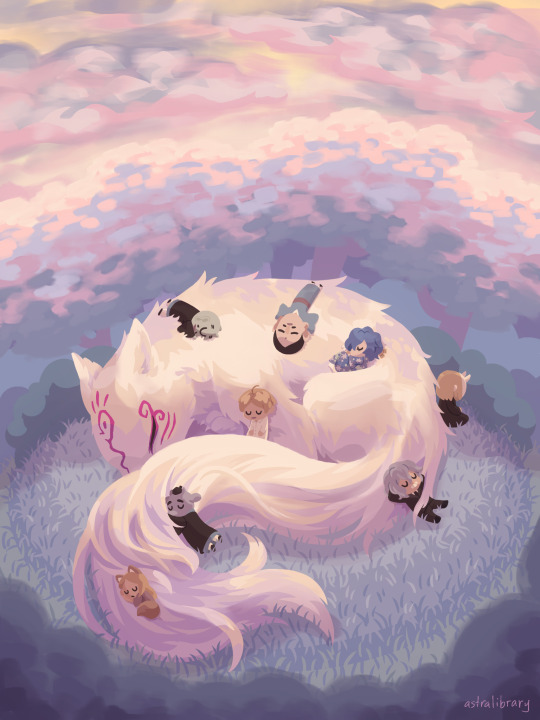
@idak04 happy holidays, i was your @natsume-ss this year! you mentioned liking the dogs' circle's antics so here they are (with a few friends) all tuckered out after a long day of fun and games ❤️
i hope you like it, and have a happy new year!! 💖
closeups!
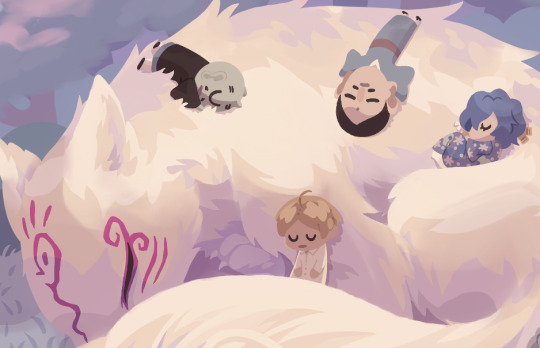
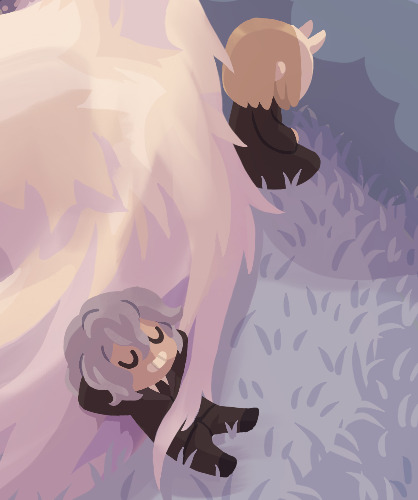
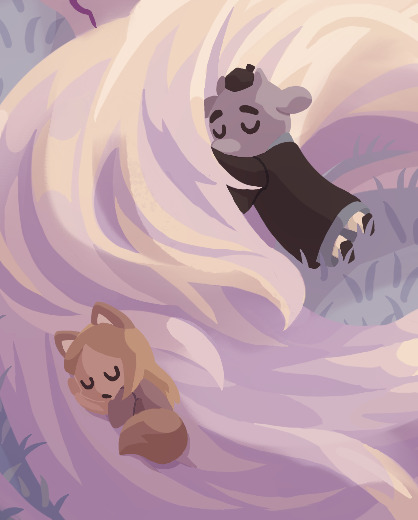
#natsumess2024#natsume yuujinchou#natsume's book of friends#natsume takashi#nyanko sensei#and the gang (<- doesn't know how to tag any of the youkai)#WAHH IM SORRY IT TOOK SO LONG#i planned to have this done days ago but i got sick orz#i hope it's to ur liking!#i wasn't quite sure who all was considered part of the circle so i just did my best#hiiragi's there too bc u said u like her! (i do too she's the best)#misuzu is in human form bc i wanted to include him but he's too big to fit in the composition i planned LOL#he is simply chillin. love that smiley weirdo
409 notes
·
View notes
Text
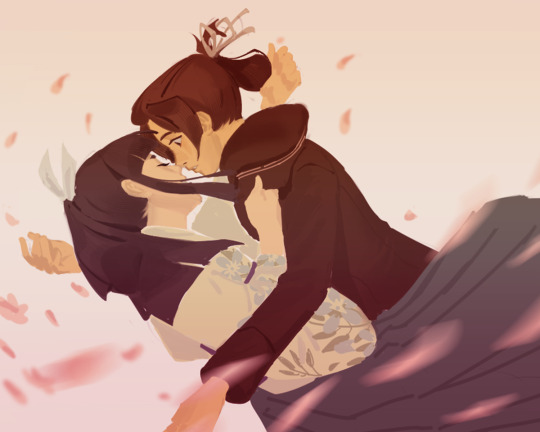
What if I told you that I've fallen?
[ID: Art of Susato Mikotoba and Haori Murasame/Rei Membami, done on a stylized background of swirling cherry blossom petals. Haori is falling backward, pulling Susato with her, so close that their noses are touching. Haori closes her eyes as she pulls off Susato’s cap, while Susato — still dressed as Ryutaro Naruhodo — looks down at her with eyes wide. The background is suffused with the faint colors of the lesbian flag. End ID]
#susahao#susarei#susato mikotoba#haori murasame#rei membami#dgs#tgaa#dgs2 spoilers#<- i guess !#.png#me: ok we've done our fill of comms for today let's do something quick and easy (doesn't do that)#this is a nightmare to tag actually. why does she have two names#also here's to hoping external links don't get hidden on here anymore i've been living with that fear since 2019#do i think that song fits them. i'm not sure. it's just stuck in my head and i don't wanna use kiss kiss fall in love
1K notes
·
View notes
Text
I've seen the headcanon that Lucanis' mother, Caterina's perfect heir, was actually similar to Illario in some ways. That she was calculating, ruthless, ambitious, obedient... all the things Caterina overlooks in Illario because Caterina sees her favourite daughter's deep brown eyes and quiet, controlled demeanor and careful planning in Lucanis.
But I am also attached to the idea that the opposite is true too. That Illario's mother shared similarities with Lucanis; that she was empathetic and stubborn, with a slight rebellious streak. But she was always outgoing and charming, was more impulsive with her emotions, and was always sharper with her tongue than with a sword, so Caterina only sees her in Illario.
I just love the idea that Caterina can't look beyond the surface and see who her grandsons really are because on some level she can't see past the ghosts reflected in their eyes. She can't see that the quiet brown eyed boy is is more of the gentle hearted rebel, and the one with blue eyes and a shining, fake smile is the ruthless leader who would do anything she asked.
#Illario Dellamorte#Lucanis Dellamorte#veilguard spoilers#I wish we knew anything about their families#Illario's name means happy. You could (and I choose to) read that as meaning his parents' main wish for him was happiness.#What does that say about them as people?#What does it mean that a Dellamorte once looked at their newborn and their only thought was 'I hope he's happy'#I have been thinking about the Dellamortes all morning at work#Lucanis' mother the favourite child the quiet one who learned to turn off her emotions and would do anything to keep her status as favourit#Vs loud emotional Illario's mother the less favourite because she was rebellious and stubborn and tried to be her own person#(as much as she could)#(Also imagining Lucanis' mother sneaking into her younger sister's room at night after she's punished and tending to her#the way Lucanis and Illario will do years later)#I like the idea of Illario's mother being a bit of a rebel because I think a lot of people look at Illario and think disobedient rebel#despite the fact that I think objectively Illario is the more obedient one#he has disobedient rebel energy but in canon he's a follower who doesn't even consider breaking the rules unless it's Lucanis' idea#(until he has Lucanis killed but you could argue even that is him following Crow rules it's just him being who Caterina raised him to be)#I really want to know what's up with their families though. Lucanis is the horse Caterina is betting on. Lucanis' mother was the first of#her children to die. What makes her so sure Lucanis is the best option? Is it just that Lucanis is less like her and she knows she failed?#Is there something about Illario that makes her see him an ineligible? I want to interview her.#anyways I have to go back to work now hopefully this all makes sense I don't have time to proofread anything oops this is how much I ramble#when I don't have the time to go back and edit it down and take out all my irrelevant thoughts
244 notes
·
View notes
Text
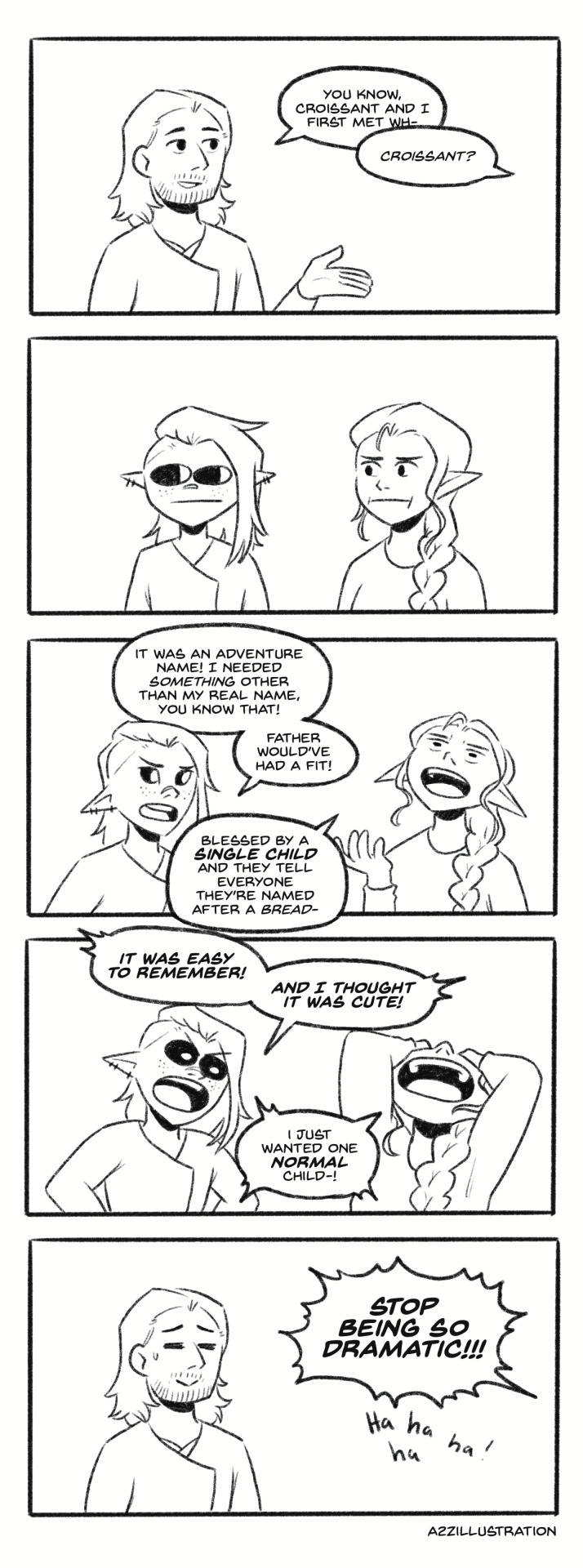

You were right and she didn't!! (Avarelle loves Croissant very much but every time they come home there’s some New Weird Thing to go over-)
🥐 Croissant Adventures Masterpost 🥐
#exceptional comment 10/10 prompt thank you LOL#I didn't have this planned but honestly she probably WOULDN'T know about the name Croissant#She doesn't use their full name out loud generally but “Croissant” would've been something cooked up during their adventures away from home#Best to take as many safety precautions as you can!#Also sorry these comics are few and far between now#I am actually currently laid the heck off so I'm hoping to have a little extra time to make some more#And if anyone knows someone looking for a FT graphic designer: hit me up heeheehoohoo#croissant adventures#bg3 croissant#avarelle#gale#gale dekarios#breadweave#comics
215 notes
·
View notes
Text
I love how the conversation between Harmony and Helena shows the tension that Helena becoming severed creates in the power dynamics, because even as a temporary PR stunt under a different name to clearly delineate them, Helly's existence is still a huge crack in the Eagan mythology. Cobell, Milchick, and Graner could be drinking the kool-aid by the bucketful, but watching a descendant of Kier allow themselves to be severed and then being placed in a position of authority over them would still have a massive subconscious impact on the way they view Helena, and by extension their perception of the Eagan's as a whole. It's a direct threat to their illusion of divinity, and you can really feel how that colors their interactions.
#i rly hope we get to dig into this this season bc even setting aside the power aspect being severed would probably have a huge impact on#helena's self perception. like she's spent her whole life being told that she's descended from a god-like figure and inherently superior to#other people and that innies aren't real people and exist to serve and then she becomes one of them. that has to be wildly#destabilizing and it would take a lot to soothe the cognitive dissonance before you even get into how it would shape the way other#people look at her. of course she'd be so insistent that helly isn't a real person--she doesn't just need to believe that to justify#their treatment of severed people she needs to believe it because the alternative would undermine the beliefs she's built her reality on#idk man i just have a lot of thoughts about this#helena eagan#helly r#harmony cobel#severance season 2#severance spoilers#severance
184 notes
·
View notes
Text
One Piece means a lot to me as a disabled person, which I think would be pretty surprising to anyone who only has a surface understanding of it. The supposed central theme of "follow your dreams" would be pretty alienating to someone like me, right? It really, really would be, if that's what it was actually about.
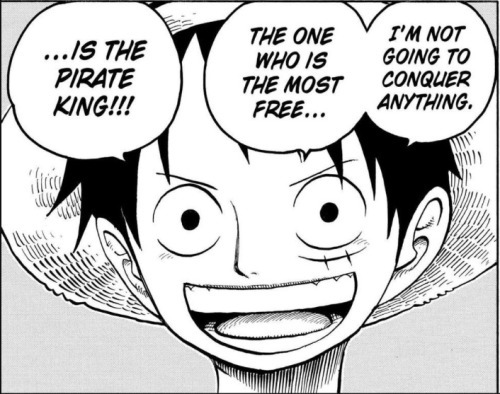
However, that ignores that Luffy's dream is to be the most free person in the world. And to attain that goal, the first thing he does is find friends to live life with. Over and over again, from the very beginning, he takes on their burdens, all in the name of being the most free.
Do you see what that would mean to me, as someone who needs more help to get by than is considered culturally normal, to the point that it puts me in a whole socially manufactured category of "other"? Not to mention, because of the infantilization of me due to that category, because of being forced so squarely into the "cared for" role, taking care of other people is deeply meaningful and empowering for me. However, the myths of independence and universal natural ability often make it emotionally difficult for my loved ones to accept that care.
The fear of asking for help, the guilt of being cared for, the weight of someone you loved who could not be as free as you, the insecurity of not contributing enough, the fear that you were born wrong, the self-hatred that says you are not worth the effort, Nami Sanji Zoro Usopp Robin Chopper Ace they all explore the painful obstacles to free connection. Through deeply impactful stories that weave beautifully into the larger one.
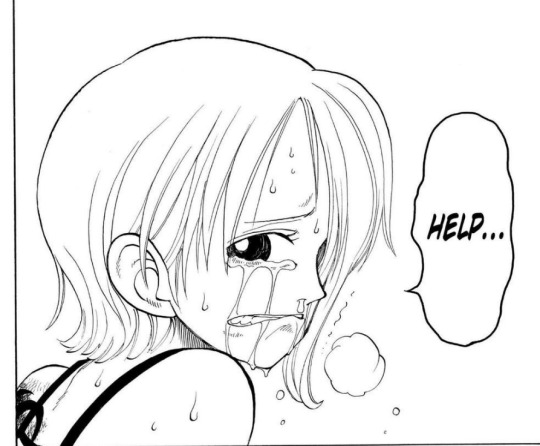
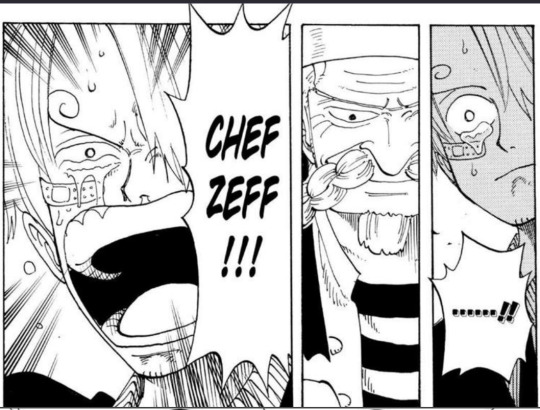
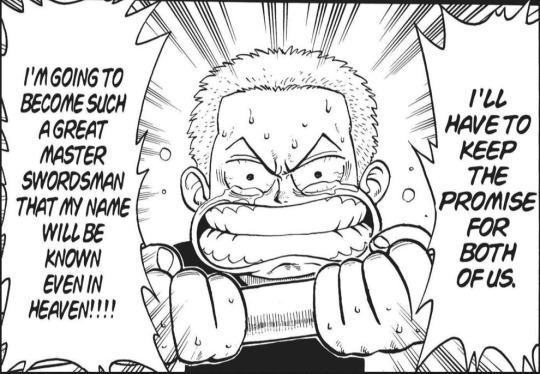
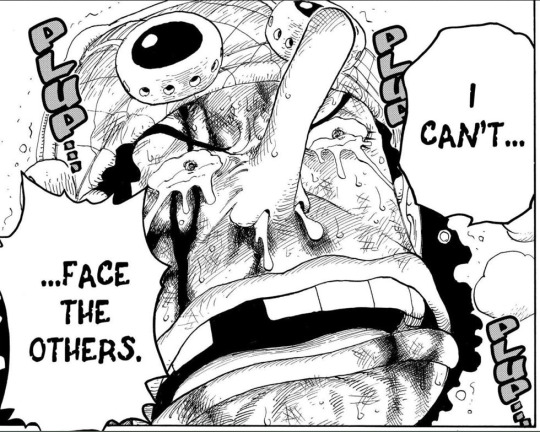
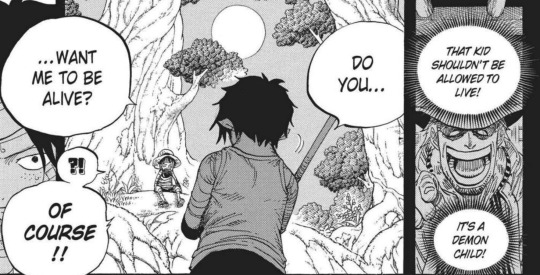
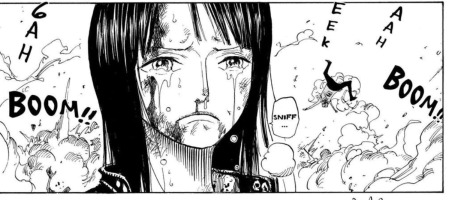
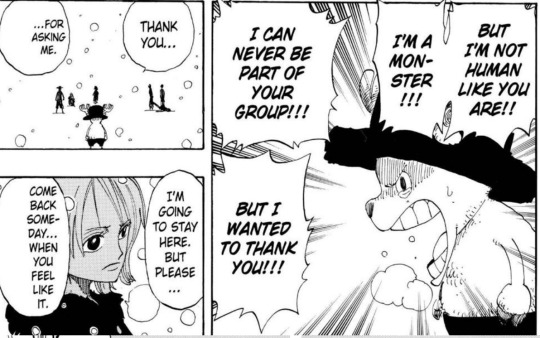
All centered around this one person who views loving them and living with them and carrying them as essential to his freedom. Who cannot, for countless reasons, live a normalized life of Structured Relations. Who views exploring and bickering and suffering and laughing with them as the ideal way to live. Who repeatedly puts his life and limbs on the line to do so.
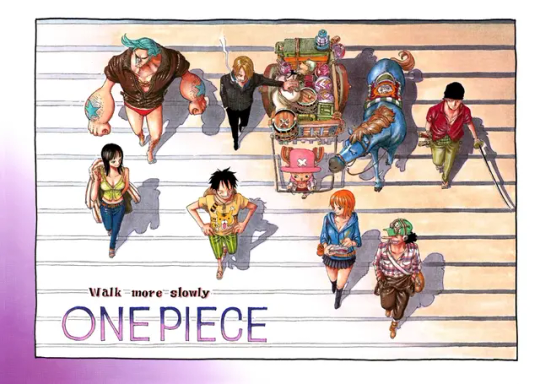
To me, it is an ultimate privilege and freedom to carry other people's burdens. To care for them and live with them. This is central to my whole perspective, and is completely informed by my life experience as a disabled person. I rarely see it reflected back to me. Let alone as powerfully and beautifully as Luffy does.
Nor the other half of it, of wanting to create this life with people in ways that aren't socially normal or approved. Of creating many varied lifelong intimate relations among equals, rather than conforming to the expectation of choosing One Person to live life with and then Creating More.
The utter lack of roles and norms is just as integral and powerful to the exploration of freedom and connection! It is meaningful to me as a queer person, yes, but even this is deeply influenced by my disability. I could never be that One Person, despite everything I have to offer, there is logistically far too much that I cannot do to be someone's equal partner in this society that demands so much from all of us. However, even if I could, I wouldn't want to! It doesn't make any sense to me to only have two people navigate life together on such intimate terms. Can't the demands of society be more comfortably met in a group? Isn't life more fun that way?
We are taught that we can and must do everything ourselves, I just happen to be one of the people that never had a chance to buy into that lie. To learn very early not just the necessity of interdependence, but the joy in it. To learn that it is most comfortably lived with more people involved. To me, close relationships are, love is, a natural extension of that understanding. One Piece celebrates interdependence constantly from the start, while never pretending that it is always easy.
The obstacles to free connection that I mentioned before, they are interspersed throughout the story, and they are always met with "I do the things you can't do, and you do the things I can't do." With, "Of course I can't use swords you dumbass! And I can't cook either! I don't know a damn thing about navigation! And I can't lie!"
These are intentionally impactful moments, and they define the series. I found it very fitting that the Fan Letter focused on a character who was empowered by Nami to feel free and live adventurously despite not being the most physically capable. The character is able by our definition, but the story is very affirming in a disability way, and it was extremely One Piece. I loved how it acknowledged this deep connection between One Piece and the lived reality of disability and celebrated it as integral as it is.
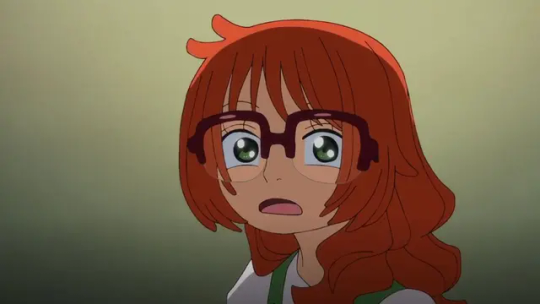
I also believe that absolutely none of this is intentional. It is simply an earnest exploration of human relationships, emotions, and behavior, and it naturally arrives at a radical and disability-affirming viewpoint. Because we are the monkey wrench in the deeply unhealthy (lol) and dominant line of thinking that independence is all. So naturally anything that also disputes that thinking has a disabled-perspective feel to it. The best part is how much it doesn't give a fuck! One Piece is aggressively against conformity in human relationships, in a way that is hard to find in our new world of self-conscious authors.
It's also, you know, the worst part, in terms of all the outrageous bigotry and offensive character design, but god damn it if it doesn't elevate the good parts to unbearable heights. Even the bad character designs can sometimes be more impactful for their intentional "ugliness", when those characters are inevitably taken seriously despite their appearance and the stereotypes they play on, it hits hard every time. I do have a simple hatred for many choices, there is no pay-off for much of the awful problems in numerous character designs and dialogue. But no matter how upset I can be by those things, in the end they can't succeed in pulling me away from One Piece. It's just so crazy and unique and great and terrible and beautiful and I LOVE IT.
#WOOF. FINALLY FINISHED THIS POST.#I am basically always trying to articulate this. I've written so many long posts.#but fan letter got me to give it my best effort once more. ITS SO GOOD!!! YES THAT'S WHAT IT'S ALL ABOUT!!!!#i love especially the meaning of it being USOPP who finds mimi (my headcanon name for nami's fangirl) and gives her directions.#he who most recently and directly struggled with his lack of ability. she doesn't even know about that.... ough....#YOU DON'T HAVE TO BE THE MOST CAPABLE TO GO ON ADVENTURES!!!!!!!!!!! GO MIMI!!!!!!!!!!!!!!!#my posts#one piece#op fan letter#opfl#one piece meta#op meta#one piece analysis#op analysis#i guess lol i hope this reaches some people despite you know. being. how i am.#(intense and clearly having gotten very deep into my particular perspective after endless verbalizing)
237 notes
·
View notes
Text
one of the things that i think we should pay attention to, socially, about the disney v. desantis thing is that it is really highlighting the importance of remembering nuance.
in a purely neutral sense, if you engage in something problematic, that does not mean you are necessarily agreeing with what makes it problematic. and i am worried that we have become... so afraid of any form of nuance.
disney isn't my friend, they're a corporate monopoly that bastardized copyright laws for their own benefit, ruin the environment, and abuse their workers (... and many other things). this isn't a hypothetical for me - i grew up in florida. i also worked for the actual Walt Disney World; like, in the parks. i am keenly aware of the ways they hurt people, because they hurt me. i fully believe that part of the reason florida is so conservative is because it's been an "open secret" for years now that disney lobbies the government to keep minimum wage down, and i know they worked hard to keep the parks unmasked and open during the worst parts of Covid. they purposefully keep their employees in poverty. they are in part responsible for the way the floridian government works.
desantis is still, by a margin that is frankly daunting, way worse. the alternative here isn't just "republicans win", it's actual fascism.
in a case like this, where the alternative is to allow actual fascism into united states legislation - where, if desantis wins, there are huge and legal ramifications - it's tempting to minimize the harm disney is also doing, because... well, it's not fascism. but disney isn't the good guy, either, which means republicans are having a field day asking activists oh, so you think their treatment of their employees is okay?
we have been trained there is a right answer. you're right! you're in the good group, and you're winning at having an opinion.
except i have the Internet Prophecy that in 2-3 months, even left-wing people will be ripping apart activists for having "taken disney's side". aren't i an anti-capitalist? aren't i pro-union? aren't i one of the good ones? removed from context and nuance (that in this particular situation i am forced to side with disney, until an other option reveals itself), my act of being like "i hope they have goofy rip his throat out onstage, shaking his lifeless body like a dog toy" - how quickly does that seem like i actually do support disney?
and what about you! at home, reading this. are you experiencing the Thought Crime of... actually liking some of the things disney has made? your memories of days at the parks, or of good movies, or of your favorite show growing up. maybe you are also evil, if you ever enjoyed anything, ever, at all.
to some degree, the binary idealization/vilification of individual motive and meaning already exists in the desantis case. i have seen people saying not to go to the disney pride events because they're cash grabs (they are). i've seen people saying you have to go because they're a way to protest. there isn't a lot of internet understanding of nuance. instead it's just "good show of support" or "evil bootlicking."
this binary understanding is how you can become radicalized. when we fear nuance and disorder, we're allowing ourselves the safety of assuming that the world must exist in binary - good or bad, problematic or "not" problematic. and unfortunately, bigots want you to see the world in this binary ideal. they want you to get mad at me because "disney is taking a risk for our community but you won't sing their praises" and they want me to get mad at you for not respecting the legit personal trauma that disney forced me through.
in a grander scheme outside of disney: what happens is a horrific splintering within activist groups. we bicker with each other about minimal-harm minimal-impact ideologies, like which depiction of bisexuality is the most-true. we gratuitously analyze the personal lives of activists for any sign they might be "problematic". we get spooked because someone was in a dog collar at pride. we wring our hands about setting an empty shopping mall on fire. we tell each other what words we may identify ourselves by. we get fuckin steven universe disk horse when in reality it is a waste of our collective time.
the bigots want you to spend all your time focusing on how pristine and pretty you and your interests are. they want us at each other's throats instead of hand in hand. they want to say see? nothing is ever fucking good enough for these people.
and they want their followers to think in binary as well - a binary that's much easier to follow. see, in our spaces, we attack each other over "proper" behavior. but in bigoted groups? they attack outwards. they have someone they hate, and it is us. they hate you, specifically, and you are why they have problems - not the other people in their group. and that's a part of how they fucking keep winning.
some of the things that are beloved to you have a backbone in something terrible. the music industry is a wasteland. the publishing industry is a bastion of white supremacy. video games run off of unpaid labor and abuse.
the point of activism was always to bring to light that abuse and try to stop it from happening, not to condemn those who engage in the content that comes from those industries. "there is no ethical consumption under late capitalism" also applies to media. your childhood (and maybe current!) love of the little mermaid isn't something you should now flinch from, worried you'll be a "disney adult". wanting the music industry to change for the better does not require that you reject all popular music until that change occurs. you can acknowledge the harm something might cause - and celebrate the love that it has brought into your life.
we must detach an acknowledgment of nuance from a sense of shame and disgust. we must. punishing individual people for their harmless passions is not doing good work. encouraging more thoughtful, empathetic consumption does not mean people should feel ashamed of their basic human capacities and desires. it should never have even been about the individual when the corporation is so obviously the actual evil. this sense that we must live in shame and dread of our personal nuances - it just makes people bitter and hopeless. do you have any idea how scared i am to post this? to just acknowledge the idea of nuance? that i might like something nuanced, and engage in it joyfully? and, at the same time, that i'm brutally aware of the harm that they're doing?
"so what do i do?" ... well, often there isn't a right answer. i mean in this case, i hope mickey chops off ron's head and then does a little giggle. but truth be told, often our opinions on nuanced subjects will differ. you might be able to engage in things that i can't because the nuance doesn't sit right with me. i might think taylor swift is a great performer and a lot of fun, and you might be like "raquel, the jet fuel emissions". we are both correct; neither of us have any actual sway in this. and i think it's important to remember that - the actual scope of individual responsibility. like, i also love going to the parks. Thunder Mountain is so fun. you (just a person) are not responsible for the harm that Disney (the billion dollar corporation) caused me. i don't know. i think it's possible to both enjoy your memories and interrogate the current state of their employment policies.
there is no right way to interrogate or engage with nuance - i just hope you embrace it readily.
#does this make sense#to do be deleted probably yikes#(takes a swing at a wasp's nest)#like i think ppl have started to just be really quiet when they like something 'problematic'#and im like... u can be like -#girl tswift NEEDS to just TAKE A BUS . LIKE?????????????????????#while also being like.#''she's a lot of fun''#if ur personal policy is that u don't support her for that reason that's great#but it's like. eating meat???#like yeah some people won't bc the environment. but the fact i eat meat doesn't mean i hate the earth#like i can say that i think the meat industry is HORRIFIC and also downright cruel to its employees#but like. still enjoy a chicken nugget....#there are people who choose otherwise. it's okay . we are people. i make like no money. u probably don't either#us fighting about whether or not it's Right To Eat The Chicken Tender just distracts from like.#actually turning your ire on the corporation#i hope it's clear what i'm saying here is like. when we fight each other for Purity Reasons#we are just doing the work of corporations . for free. like they WANT us to be doing this lol#it's the fucking DREAM of the upperclass that now ALL forms of responsibility fall on the individual
5K notes
·
View notes
Text
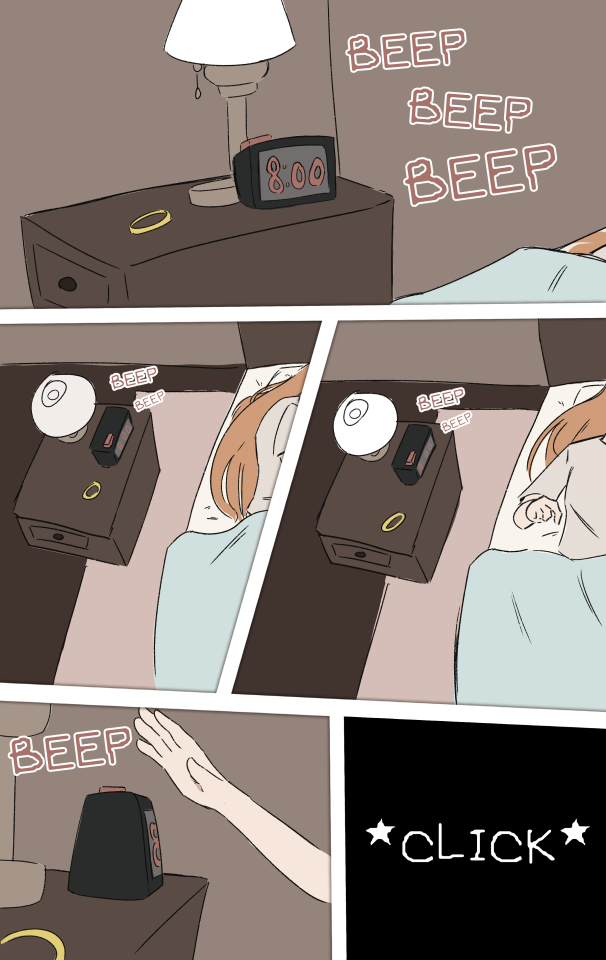
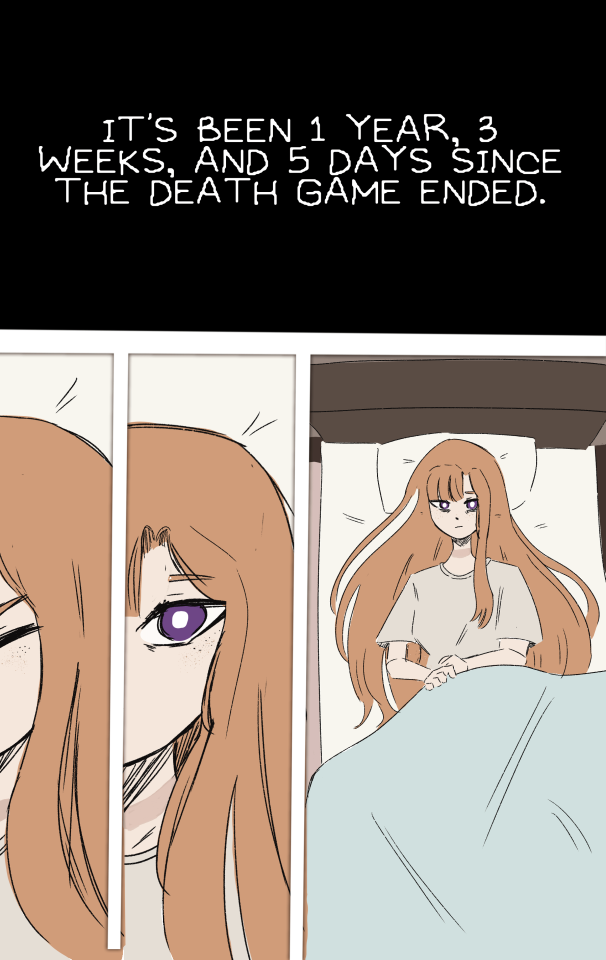
Moving Forward. (Spoilers for YTTD up through 3-1b)
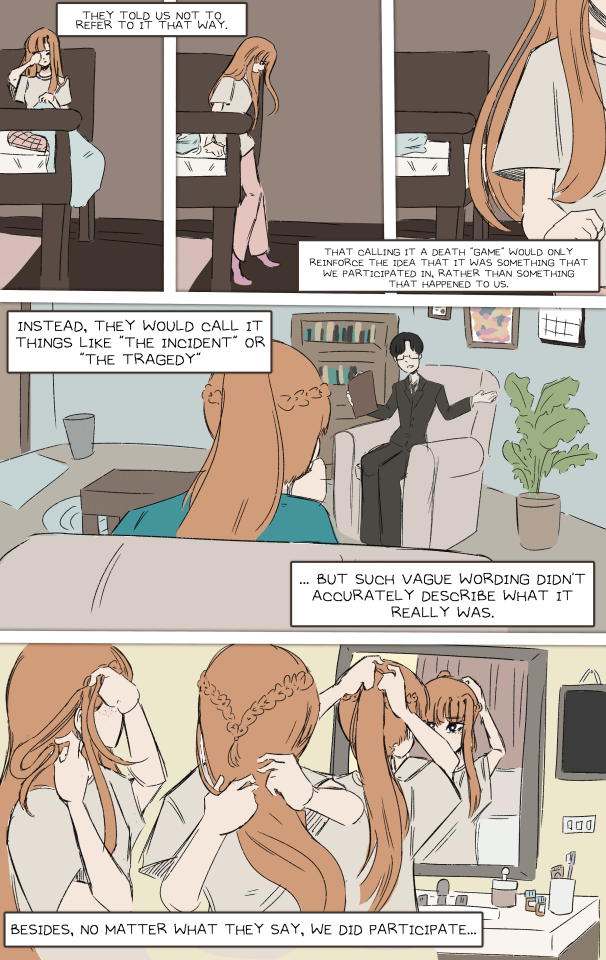
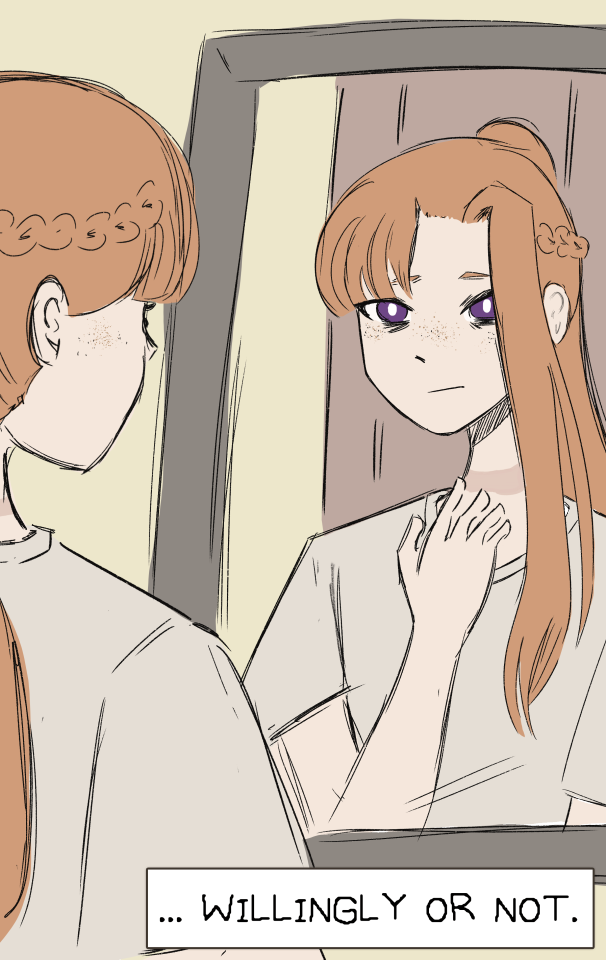
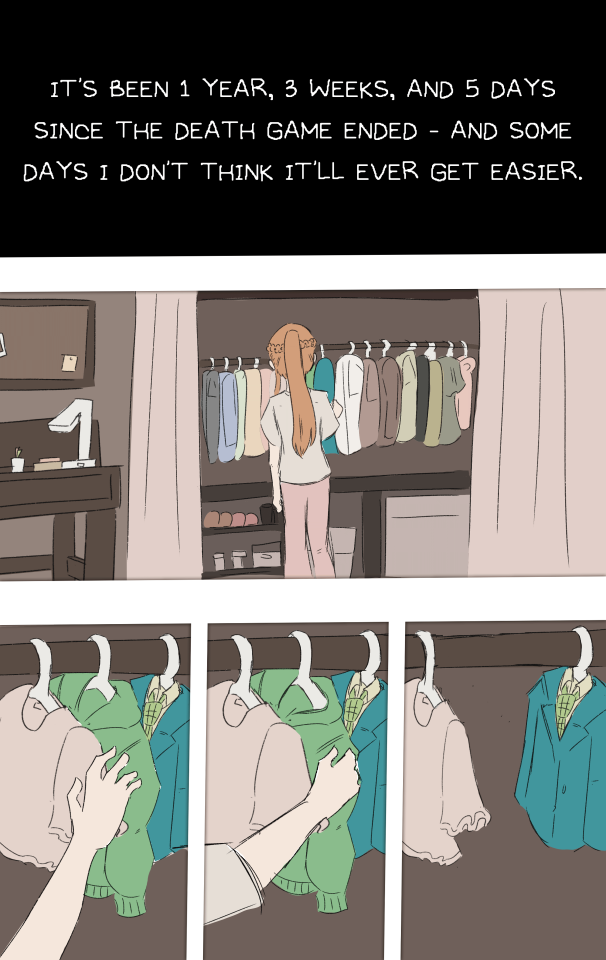
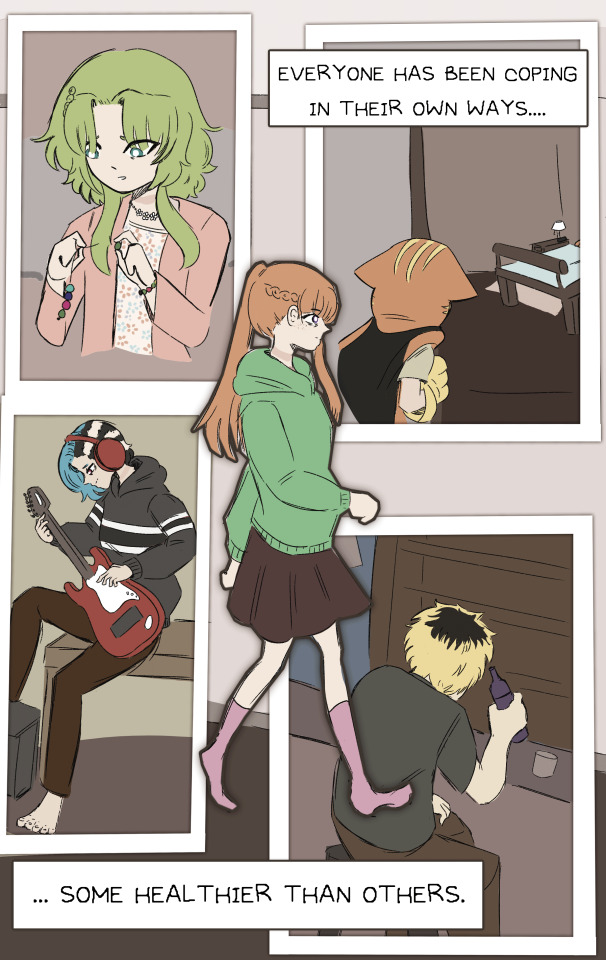
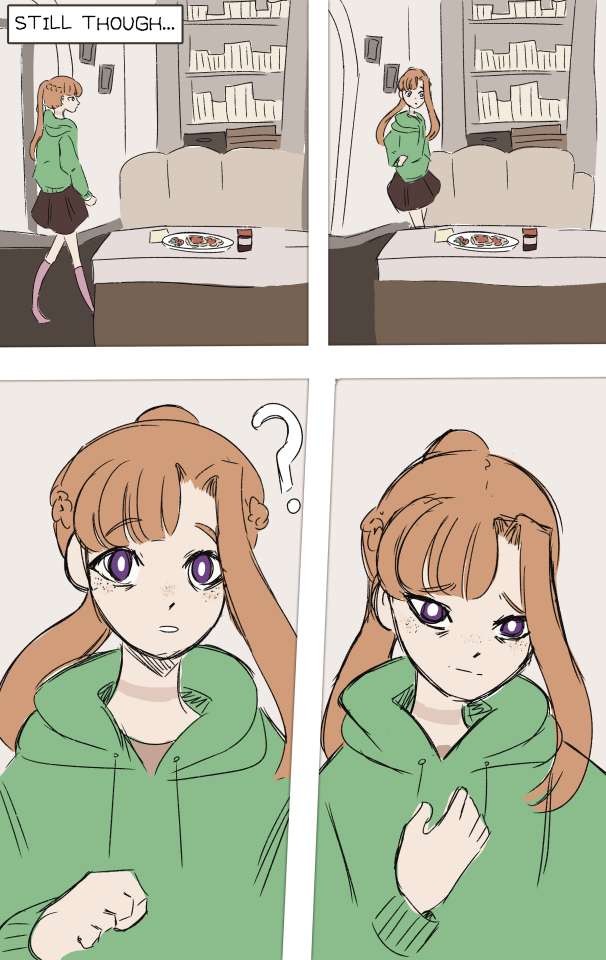
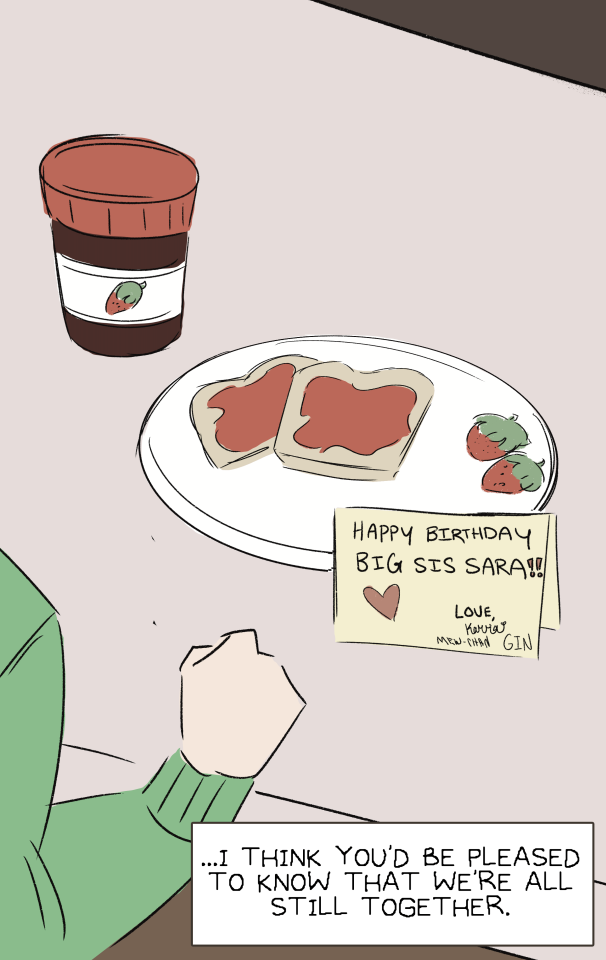
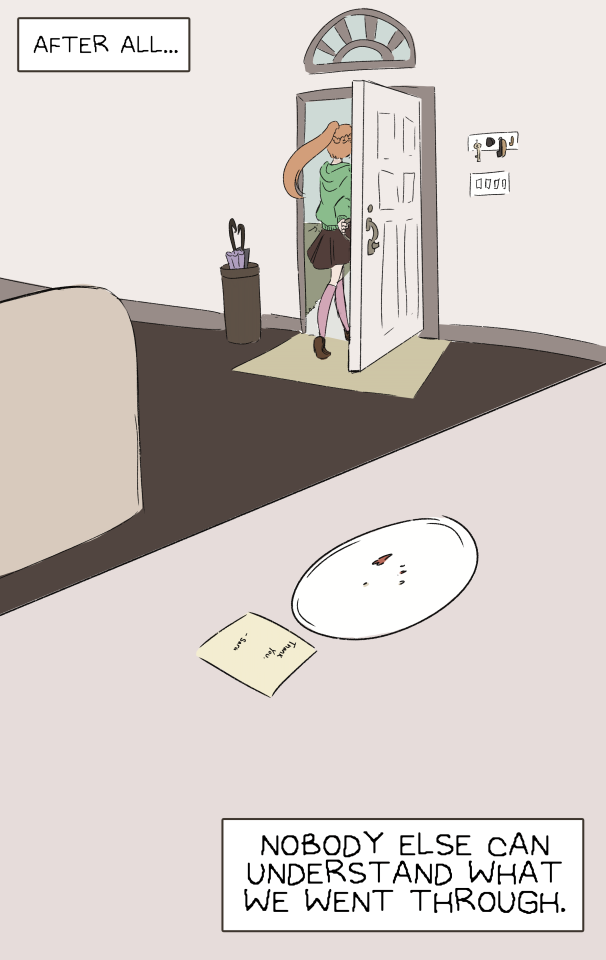
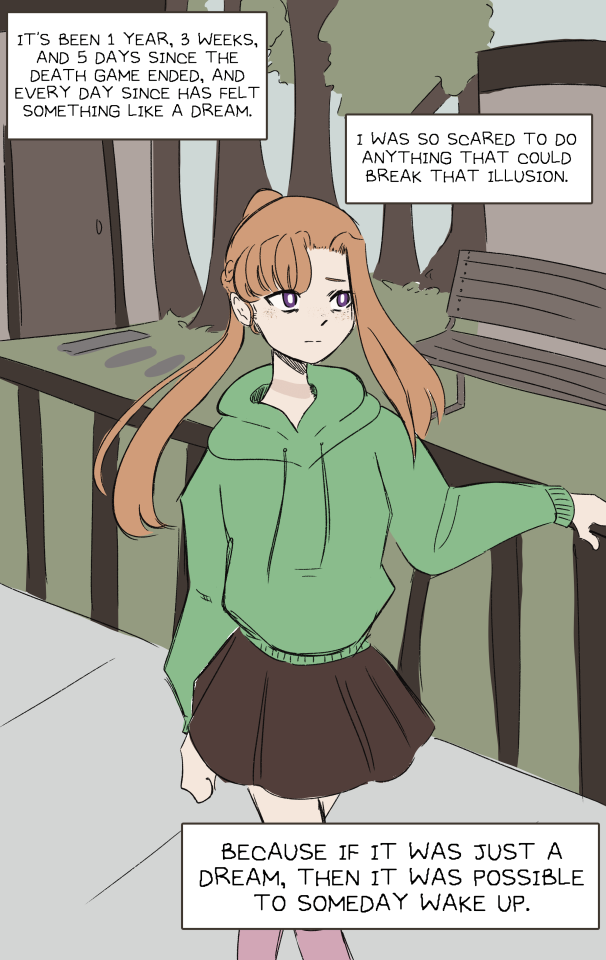
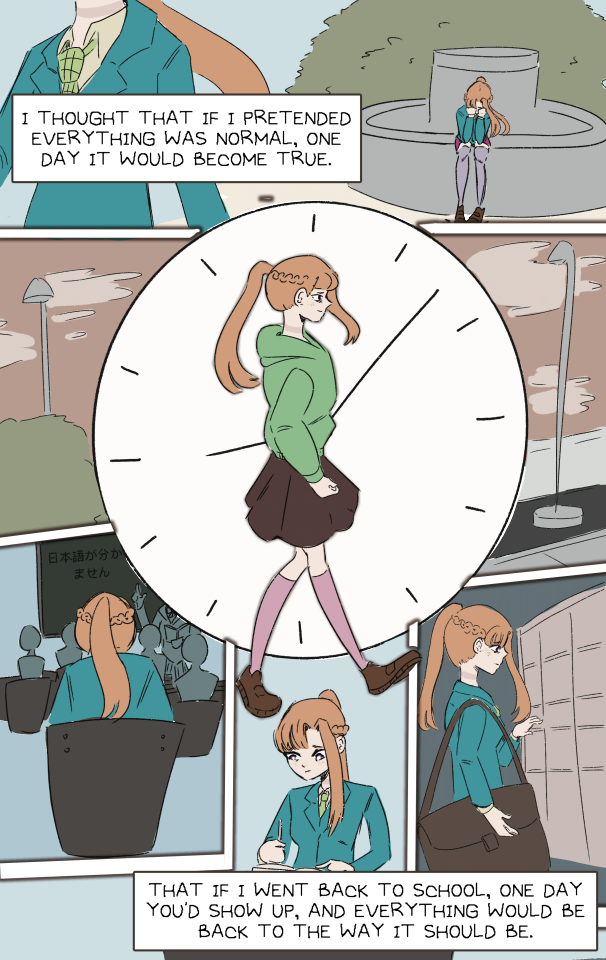
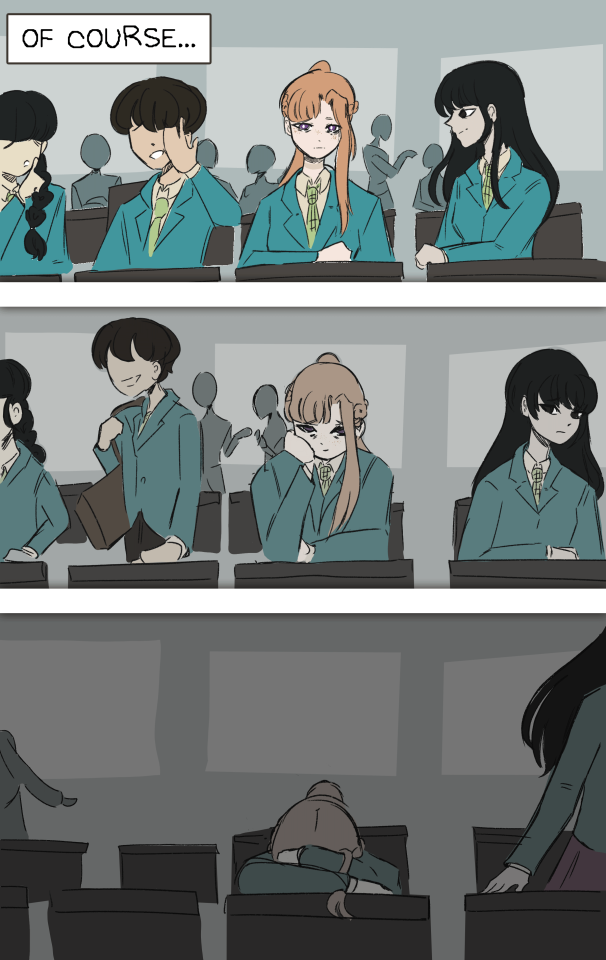
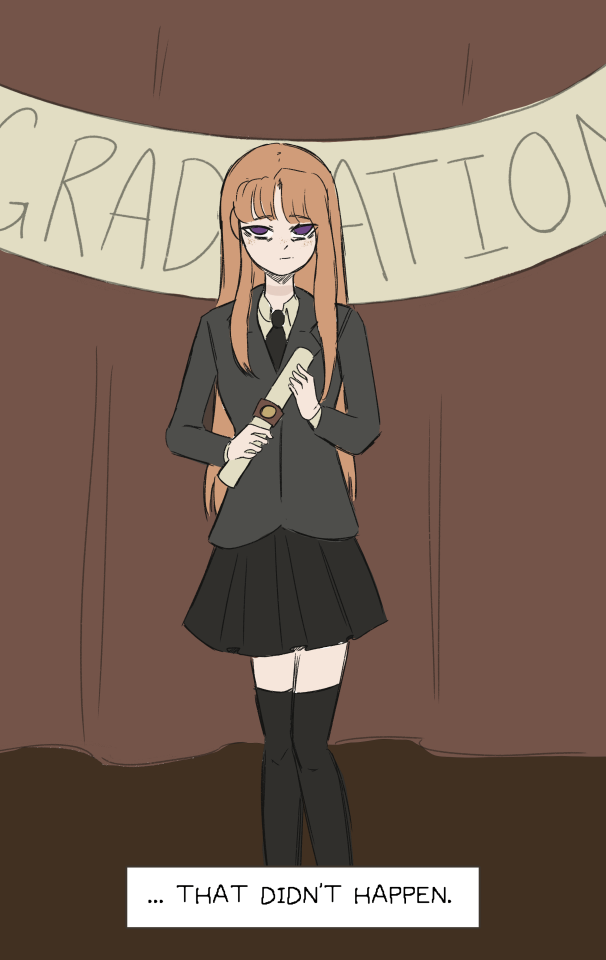
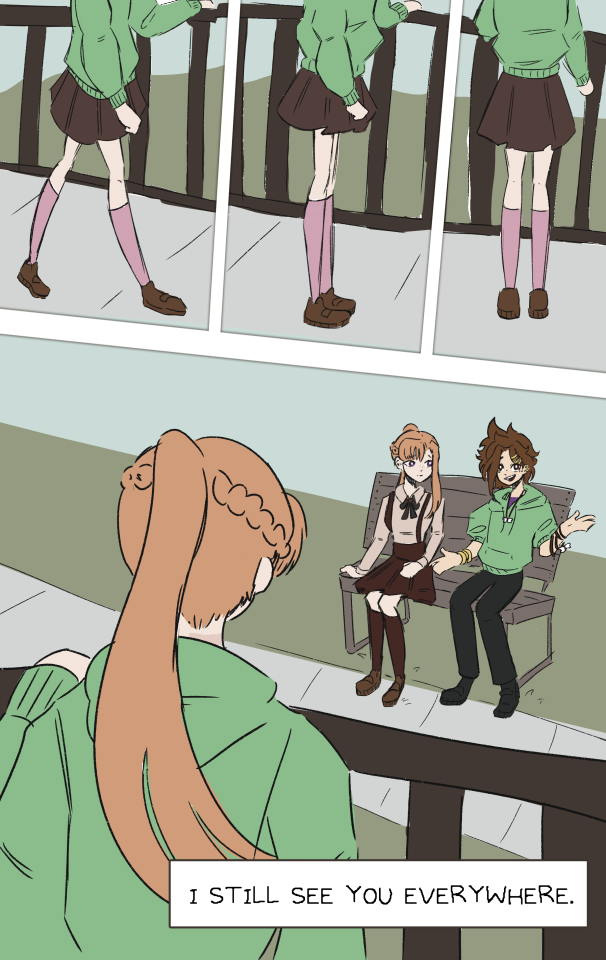
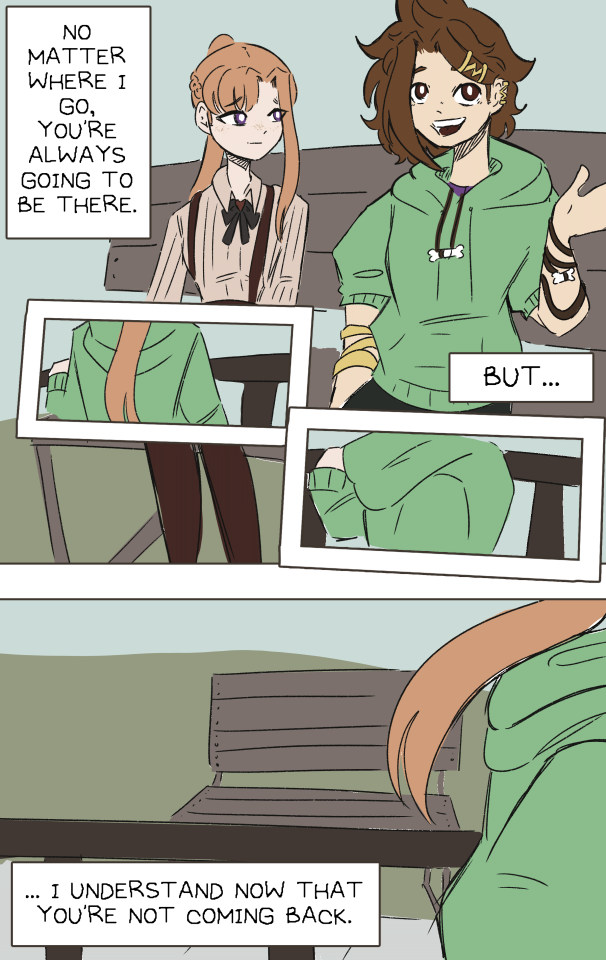
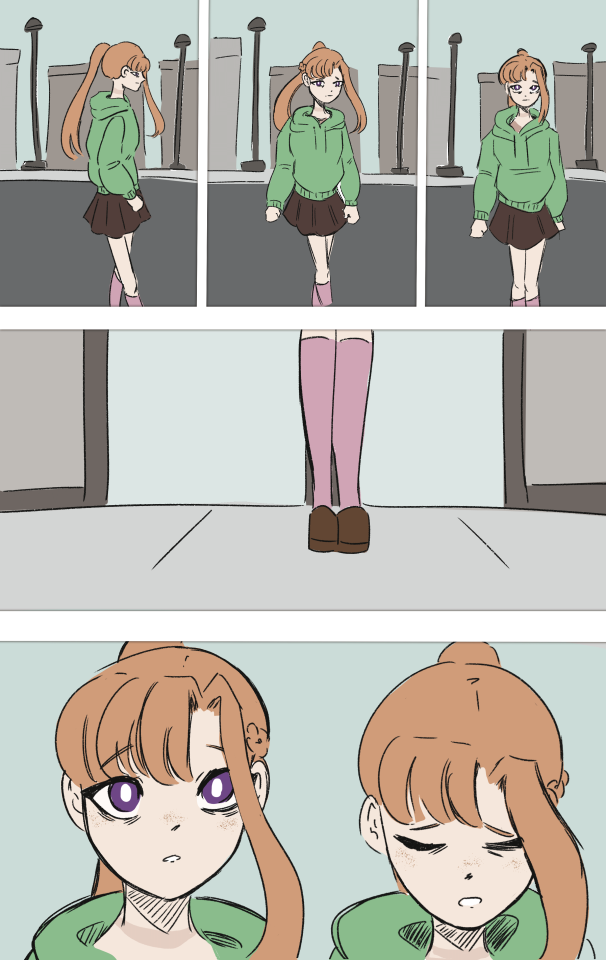
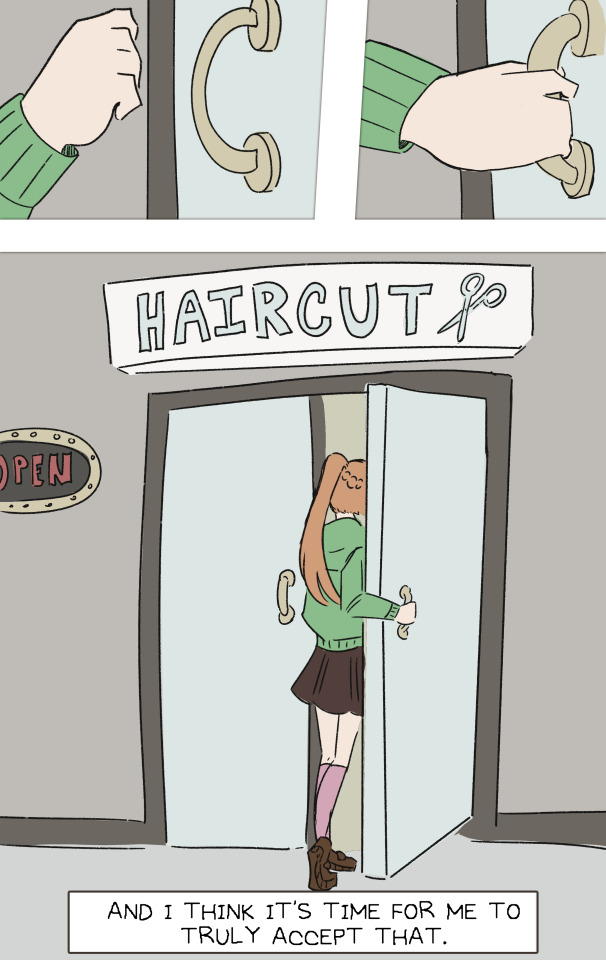
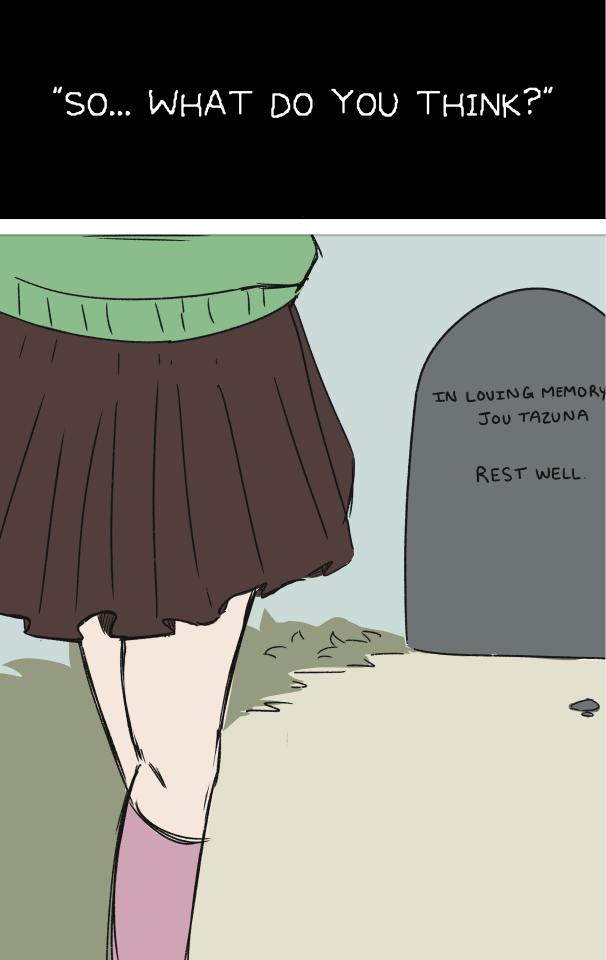
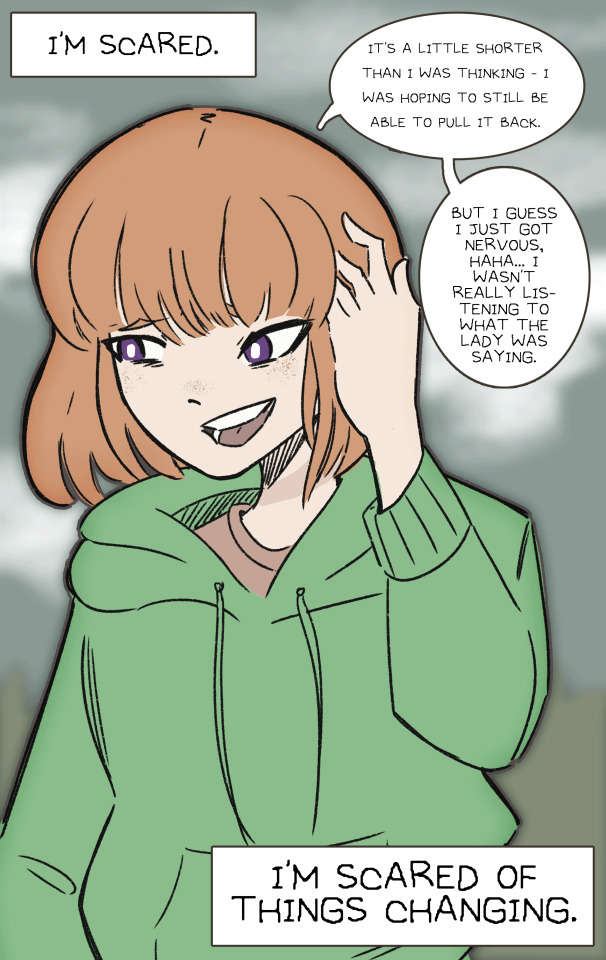
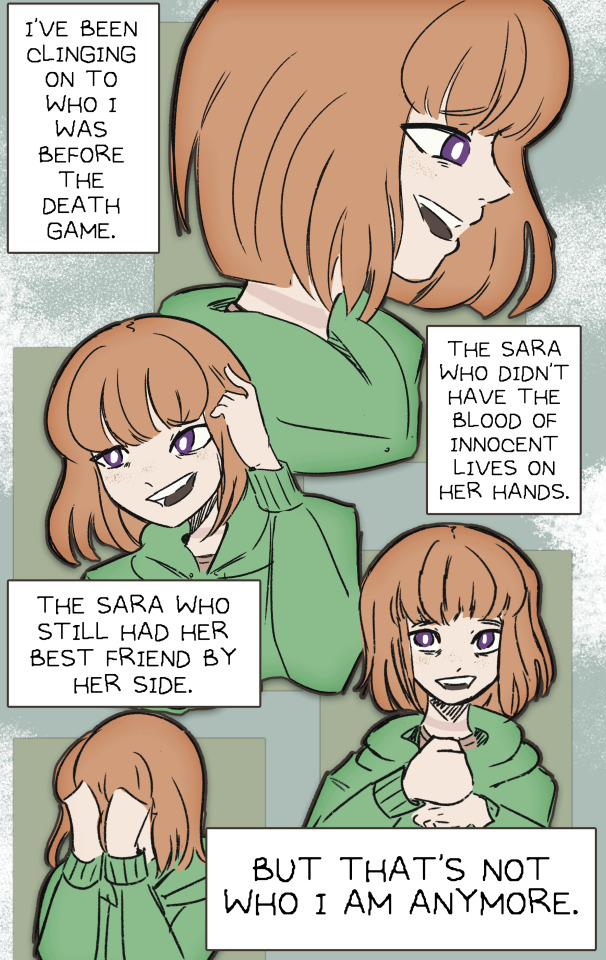
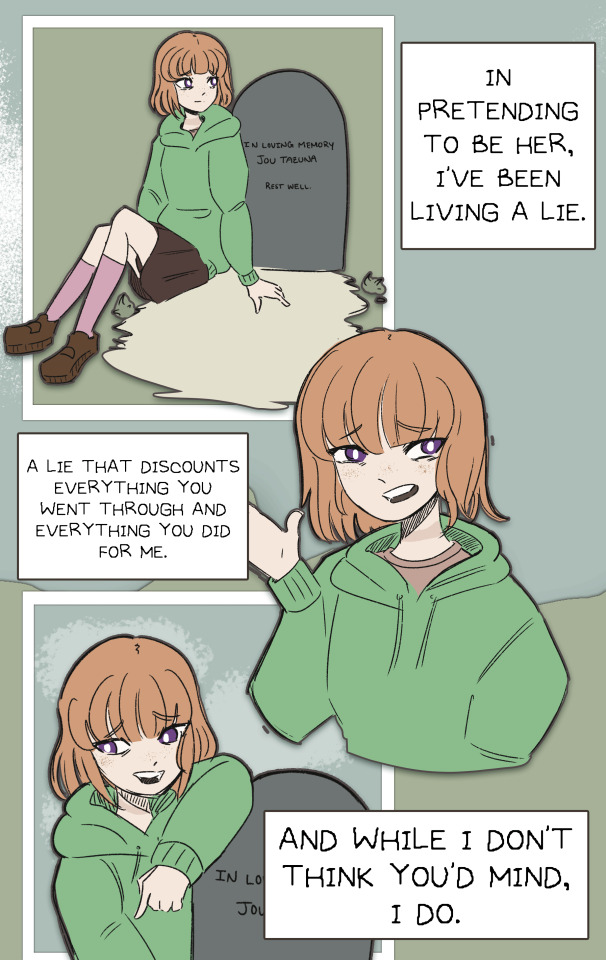
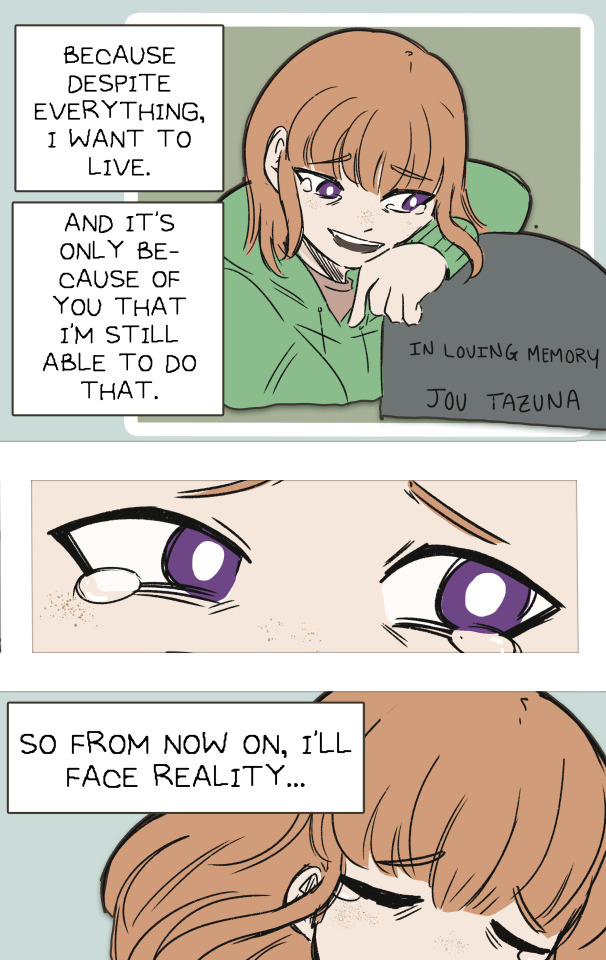
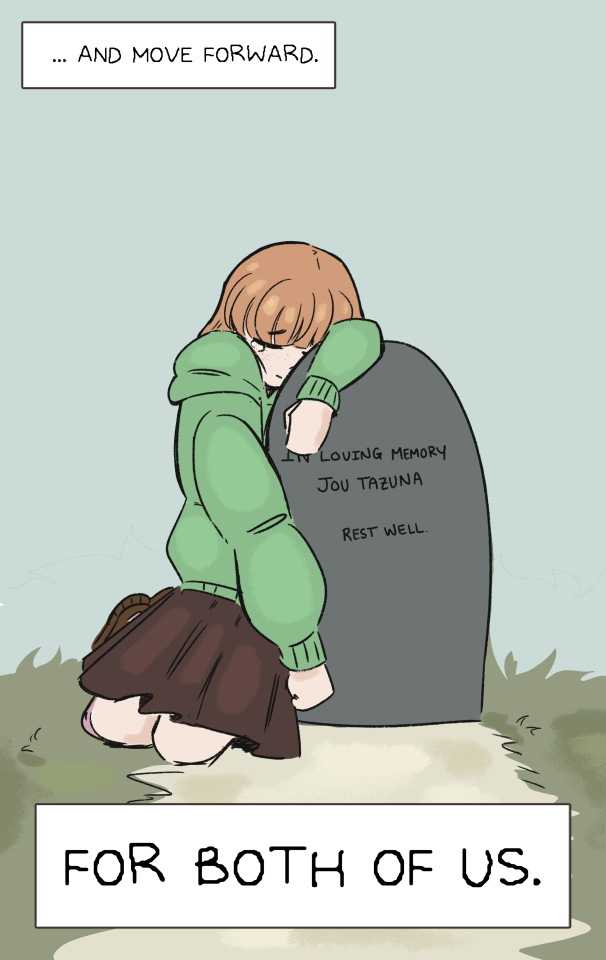
#your turn to die#yttd#yttd fanart#sara chidouin#joe tazuna#happy birthday sara#post-death game au#set in the Kanna/Alice lives route because that's personally my favorite#there are so many little hcs in this#sara will forever have freckles in my art#alice dyed his hair to match reko#also he's trying to get back into music for her#whether that's healthy or unhealthy is yet to be determined#Keiji is not doing so hot#angst#your turn to die fanart#ryoko isn't being mean i promise she just doesn't know how to help#yes sara is wearing joe's jacket#joesara >>>#I'm like 20 minutes late but I hope you enjoy regardless#god this took so long#I ran out of time to shade it I'm sorry </33#I hope you enjoy anyways!!#or don't#sorry for the angst on your birthday sara you deserve so much better
563 notes
·
View notes